
Catholics for Renewal
Subtitle
News 2019
Views expressed are those of the Authors and may or may not always represent those of Catholics For Renewal.
Extract from ABC News, Photo from National Catholic Reporter, 18 December 2019
Extract from Joshua J. McElwee, National Catholic Reporter, 17 December 2019
Vatican City — Pope Francis Dec. 17 abolished the Catholic Church's practice of imposing strict confidentiality rules on the Vatican's legal proceedings in cases involving clergy sexual abuse or misconduct, in a reform sought for decades by abuse survivors and advocates. In a brief but sweeping new instruction that goes into effect immediately, the pontiff states plainly that the practice, known as the pontifical secret, is no longer to apply to any accusations, proceedings, or final decisions involving clergy abuse. While such matters will continue to be treated with a lower level of confidentiality, the pope also specifies that anyone who files a report, alleges abuse, or comes forward as a witness to abuse "shall not be bound by any obligation of silence with regard to matters involving the case." The new instruction, which contains five short points, is titled Sulla riservatezza delle cause ("On the Confidentiality of Legal Proceedings")....(more).

Extract from Melbourne Catholic, Tuesday 10 December 2019, republished here 17 December 2019
The Council of Catholic Social Services Victoria is pleased to announce the appointment of Joshua Lourensz to the position of Executive Director. Josh was chosen for his demonstrated passion for social justice underpinned by his commitment to Catholic social teaching and ethos. He has strong communication skills and experience at the cutting edge of advocacy for those disadvantaged and on the margins. He will be known to many people working for our members as he has been involved in a number of CSSV activities in recent years. Josh has most recently been working as National Coordinator of the Catholic Alliance for People Seeking Asylum, a broad alliance of Catholic organisations, schools, parishes and individuals co-convened by Jesuit Social Services and Jesuit Refugee Service Australia. CAPSA works to both positively influence government policy and hearts and minds, towards a more compassionate response to refugees. Prior to this he has worked over the past decade for a range of social service organisations in policy, governance and direct service provision roles, with particular concern for homelessness and issues pertaining to people seeking asylum. He is a member of the Society of St Vincent de Paul, and sits on the Boards of the Brigidine Asylum Seekers Project and the Arena Foundation. Josh has completed a Bachelor of Arts (Honours) in Social Theory and Anthropology and a Diploma of Languages: French. Josh will commence on 13 January, 2020.....(more) Photo: Melbourne Catholic, CVSSV Josh Lourensz-1
Cardinal Ouellet says three out of 10 priests decline becoming bishop
Limited extract from Xavier Le Normand, Global Pulse, subscription hournal La Croix International, 13 December 2019
France. Cardinal Marc Ouellet, prefect of the Congregation for the Bishop, states that proportion of priests declining to be bishops has tripled in 10 years....(source)
Extract from CathNews, The Catholic Leader, 13 December 2019
“I don’t know about you, but it’s been a very, very tough year,” Brisbane Archbishop Mark Coleridge said, reflecting on 2019 during a Facebook Live session. “… We’re preparing for what we call a Plenary Council; we’ve got to make big decisions about the future, and that in itself can create a particular kind of pressure,” he said during a half-hour session in which he talked frankly about challenges facing the Church, the nation and the world, and answered online questions. “Across the nation we’ve had droughts and fires … a lot of people are doing it very hard at this time in this country. “If you look around the world it’s not much better – all kinds of political problems, economic problems, there’s all the usual problems and the world in many ways looks in bad shape.” However, in a world that can feel “dark, empty and chaotic”, Archbishop Coleridge said during the season of Advent the voice that cried out was “the voice of hope”. “Real hope is at the heart of Christianity,” he said. “Christmas itself is when God becomes one of us (and) is also a feast of hope....(more). Photo: Catholic Leader, CathNews 20191213
Extract from Philippa Martyr, the Catholic Weekly, 13 December 2019
The Catholic Church in Australia is in the middle of a Plenary Council process. So far, it’s produced easily predictable patterns of responses: those who want what they can’t have, versus those who want their patrimony back. How do you measure how well the Church is doing its job? Ultimately only God can do that. Measuring the number of people employed by the Church or enrolled in Catholic schools means very little. There are incentives for working for the Church (salary) or attending a Catholic school (good grades). Measuring the number of people helped by its charities simply measures the number of people out there that need help. Around 90 per cent of Australian Catholics believe that attending Mass on Sundays – the core worship requirement of every Catholic – gives them nothing in return. That’s why they aren’t there. Yet if we wanted to measure anything from the outside, the single best indicator of how well the Church is delivering its core business is the Mass attendance rate. Of our approximately 600,000 practising Catholics in Australia, around two-thirds of them are over 60 years of age. This got me wondering about the declining rate of Mass attendance that we note every five years. Is this jaded young people voting with their feet? Is this angry adults leaving because of the abuse crisis? Or is there something else going on? We don’t really know, because no one has been morbid enough to look at Australian death rates for the over-60s and do the math. That is, until now....(more). Photo: Anointing the sick Catholic Weekly Giovanni Portelli 20191213
Extract from Pastoral Research Online, Issue 46, September 2019, 13 December 2019
The 2016 Social Profiles of the Catholic community in each of the 28 geographical dioceses in Australia have now been released on the NCPR website. A printed copy of the profile has been sent to each of the relevant bishops. The profiles can be viewed online or downloaded for printing HERE Profiles for individual parishes are expected to be available by early 2020. Below are the top five dioceses for various measures, based on their diocesan rank. All figures refer to Catholics only, where the term ‘Catholic’ refers to all persons who identified themselves as Catholics in the Census. The figures for Catholics in the whole of Australia are included in each table for comparison.....(more)

Extract from Elise Harris, Senior Correspondenty, Crux, 12 December 2019
Swedish teenage environmental activist Greta Thunberg holds up a sign as Pope Francis greets her at the end of his weekly general audience, in St. Peter's Square, at the Vatican, Wednesday, April 17, 2019.
ROME - On Thursday top Vatican officials hailed Swedish teen Greta Thunberg, recently named TIME Magazine’s “Person of the Year” for her environmental advocacy, as a “great witness” of Church teaching on care for creation and the human person. Speaking to reporters at the Dec. 12 publication of Pope Francis’s message for the 2020 World Day of Peace, celebrated on Jan. 1 each year, Cardinal Peter Turkson, prefect of the Vatican office for Integral Human Development, called Thunberg “a great witness to what the Church teaches on the care of the environment and the care of the person.”
“What is her objective? Skipping school for a future, a future that can’t be guaranteed because there is no care for the environment,” he said, adding that in many cases, there is a complete lack of coherence between the international policies on the environment and what children are told.....(more). Photo: Greta Thunberg Vatican Media via AP Crux 20191212

Extracts from John Warhurst. Eureka Street, 11 December 2019
The wider community should be aware that the Catholic renewal movement in Australia continues to grow. It has been stimulated by Vatican II teachings and more recently by the inspiration of the vision of Pope Francis. Within Australia the Royal Commission into Institutional Responses to Child Sexual Abuse's recommendations helped generate special interest in reform of church governance, structures and culture. Then the preparations for the Plenary Council 2020 (PC2020), a national gathering to discuss the future of the Catholic Church in Australia, opened up more possibilities for local and diocesan discussions mandated by church leadership. Concerned Catholics Canberra Goulburn was created in April 2017, a newcomer to the renewal movement. Our motivation was a desire to press the Australian bishops to implement the royal commission recommendations at the meeting the following month of the Australian Catholics Bishops Conference. We act as a ginger group within church circles and a public lobby group from without. Driven by a desire for lay co-responsibility and greater leadership, especially for lay women, we run public forums and workshops, make submissions to church leaders and to PC2020 and connect with priests and religious.....Recently Concerned Catholics Canberra Goulburn has been privileged to play a part in two further church renewal developments. On 24 October we provided three speakers at a public meeting to launch Concerned Catholics Wagga Wagga Diocese (CCWWD), under the general heading of Accountable, Inclusive and Transparent: A Better Church for Australia. In a notably more conservative diocese than Canberra-Goulburn, CCWWD is determined to extend the message of renewal to other centres in the diocese, including Albury and Leeton. More recently, on 7 December I addressed a meeting in Launceston of parish representatives from across Tasmania at which it was agreed to create a new state-wide body, Concerned Catholics Tasmania (CCT).........(more). Photo: Leelakajonkij Getty Eureka Street 20191211
The refusal to consider synodality as a key part of the Church's response to the abuse crisis is a failure of ecclesial imagination, argues Massimo Faggioli
Limited Extract from Massimo Faggioli, subacription journal La Croix International, 10 December 2019
....If you blinked, you probably missed it. But this past Sunday was the 150th anniversary of the opening of the First Vatican Council. It was on Dec. 8, 1869 that Pope Pius IX convened the council that would come to be known for its declarations on papal primacy and infallibility. It would be the symbol of an assertive Catholicism that pushed back against liberal modernity. Catholic missiologist Robert Schreiter has observed that Vatican I paved the way for a "period of certainty" within the Church....(source)

Extract from CathNews, 6 December 2019
Catholic Professional Standards Ltd has published its 2018-19 annual report, marking three years of operation for the organisation. CPSL was formed in response to the findings of the Royal Commission into Institutional Responses to Child Sexual Abuse. It has been tasked with developing robust safeguarding standards to effectively safeguard children and vulnerable adults who come into contact with the Catholic Church in Australia and auditing the compliance of Church entities in Australia with these safeguarding standards. In May, CPSL published the first edition of the National Catholic Safeguarding Standards (NCSS). CPSL chief executive officer Sheree Limbrick said this year had been a “big year of milestones” for the organisation. “Publishing the NCSS, developing and rolling out a national training and development program for Church personnel to support implementation of the NCSS, and commencing safeguarding audits of Church entities against the NCSS has made this a huge year for us,” Ms Limbrick said. CPSL has so far published two safeguarding audit reports of Church entities in 2019 – the Presentation Sisters Wagga Wagga and the Ballarat Diocese – and anticipates publishing a further two audit reports before the end of the year. “As of the end of November 2019, 54 per cent of identified Catholic entities in Australia (141 out of 262) – dioceses, eparchies, religious institutes, ministerial public juridic persons, associations of Christ’s faithful and other Catholic organisations – have formally engaged with CPSL,” Ms Limbrick said. “When the Australian Catholic Bishops Conference (ACBC) and Catholic Religious Australia (CRA) approved the Standards in May this year, they indicated an expectation that all Catholic entities across Australia are expected to implement the standards, in line with community expectations that all institutions across Australia implement the National Principles for Child Safe Organisations....(more). Photo: Sheree Limbrick CPSL CathNews 20191206
Extracts from Junno Arocho Esteves, Crux Now, Catholic News Service, 4 December 2019
VATICAN CITY - Pope Francis and his international Council of Cardinals reviewed aspects of the draft of the apostolic constitution that would govern the Roman Curia, including a greater role for lay men and women. The Vatican press office issued a statement Dec. 4 saying the council also discussed the relationship between the Curia - the Church’s central administrative offices - and the bishops’ conferences around the world. “The activity of the council was aimed at deepening two aspects of importance pertaining to the draft of the new apostolic constitution,” the Vatican said. It included, “the relations between the Curia and the episcopal conferences and the presence of the lay faithful, men and women, in decision-making roles in the offices of the Curia and in other bodies of the Church, and to study the theological-pastoral basis of these aspects.” The council members met Dec. 2-4, and Francis was present except when he had a scheduling conflict.....The pope and the Council of Cardinals, the Vatican said, will continue to “read and evaluate” the proposals at their next meeting, which is scheduled for February......(more)
Extract from Esther Marshall, The Tablet, 4 December 2019
A former Pentecostal minister and married father of five has been approved for ordination by the Vatican. Deacon Drake McCalister will become the first married priest to be ordained in Steubenville Diocese, in Ohio. He will be ordained on December 19. McCalister served as a Pentecostal pastor for 13 years but resigned his pastorate after he began to be drawn to Catholicism. He was ordained to the diaconate in 2018. After five years of study and discussions with his wife, the pair decided to join the Catholic Church with their children in 2004. But it was only in 2010 that McCalister considered ordination. Catholic News Agency reported that he will draw from his family life in homilies and is most excited for “life in the spirit and engagement in the mission”.....(more)
Extract from by Donald Snyder, National Catholic Reporter, 4 December 2019
There's growing dissatisfaction with the Catholic Church in Germany, as the church there begins a "synodal path" aimed at renewal. More than 200,000 Catholics left the church in 2018, according to the German Bishops' Conference. This plunge in numbers continues a years long trend. "The current statistics are worrying," Jesuit Fr. Hans Langendörfer, secretary of the German Bishops Conference, said in a statement. "There is nothing to gloss over about the numbers. They confirm a trend that has shaped the church in recent years." "If these massive departures continue at this rate, a minority of Germans will be churchgoers in five to 10 years," said Philipp Gessler, a former religion editor at Deutschlandfunk, Germany's national public radio. For the first time in 1,000 years, the majority of Germans will have no religion at all, he said. Growing secularization is eroding membership in both Catholic and Protestant churches. Currently, there are approximately 23 million Catholics and 21 million Protestants in Germany, which has a population of 83 million.....(more)
Extract from Press Release, Dublin Diocese, 3 December 2019
The Archbishop of Dublin, Diarmuid Martin, has said training must begin immediately to prepare volunteers in parishes to support families in preparation for Baptism, Confession, First Communion and Confirmation. For some time a consultation has been taking place throughout the Archdiocese in an effort to strengthen the bond between family, parish and schools in preparing children for sacraments. This week, Archbishop Martin wrote to priests and parishes informing them of a proposal by Priests Council endorsing a new approach to the sacraments, centred on supporting parents in sharing faith with their children and that in time will see parishes will assume responsibility for the preparation and celebration of all four sacraments. In his letter Archbishop Martin said that “at the heart of the proposal is to stress the primary role of families in sacramental preparation. It also advocates a renewed relationship with Catholic schools in promoting Catholic ethos and in delivering the Grow in Love programme.” He said that any change must be achieved in line with the differing circumstances of each parish. “We must remember too that more and more Catholic children today attend other than Catholic schools. The proposal is not something that will be accomplished overnight; it cannot however be put forever on the long finger. We must begin now”, said Archbishop Martin. “It will take some time to put in place an effective development of parish capacity to implement this initiative. We need however to begin immediately with the preparation and training of voluntary lay catechists and the development of resource materials.” This week’s decision by the Priest’s Council is the culmination of a process that began in September 2018. A sacraments review group was set up to consult widely and make practical recommendations on the future practice around Baptism, First Reconciliation, First Communion and Confirmation. 1800 people responded to an online survey. This reflected the views of parents, parishioners, clergy those in parish ministry, schoolteachers and principals. In addition there were a number of focus groups with young parents who were not regular churchgoers, to hear their voice more clearly. Three assemblies were subsequently held across the Diocese, where the outcomes of the survey were presented and discussed.....(more)
Extract from Christa Pongratz-Lippitt, The Tablet, 2 December 2019
The Gospel message has been 'obscured and even terribly damaged' by the clerical sexual abuse of minors.
The two-year German “synodal procedure” for church reform was officially launched on the first Sunday of Advent. Working together with the lay Central Committee of German Catholics (ZdK), the bishops will seek a way forward following the devastation caused by the clerical abuse crisis and the ensuing massive exodus from the German Church. Special synodal candles were lit before Mass in all 27 German cathedrals and the four co-cathedrals. Conference president Cardinal Reinhard Marx of Munich and the vice-president of the ZdK, Karin Kortmann, who are both members of the synodal procedure’s presidium, lit the synodal candle together in Munich Cathedral at the 10am Mass. In his sermon Marx underlined how important it would be to listen to one another and reach consensus despite differences of opinion. “After the ghastly experience of discovering that clerical sexual abuse occurred in the Church, it is now crucial to examine systemic dangers like bad governance organisations. In order once again to become credible witnesses of joy and hope, we will have to remove certain obstacles." In their video message after Mass, Cardinal Marx and ZdK president Thomas Sternberg said: “Credibility is an absolute must and we want to regain it through self-critical discussion.” In the coming two years, the synodal procedure will discuss how to solve those systemic problems in the Church which had fostered abuse and which stood in the way of credibly proclaiming the Gospel message......(more).
.....On 17 September 2019, a book produced by an organisation called Catholics For Renewal and titled ‘Getting Back On Mission: Reforming Our Church Together’ (GBOM hereafter), was launched at Melbourne University’s Newman College. The book doubles up as a submission to Plenary Council 2020/21, urging it to lobby the Holy See to make changes to definitive Catholic teaching along lines that if approved would represent a corruption of the Church’s doctrine. In reality this could never happen, since God himself through the Sacred Magisterium of the Church, protects the integrity of the essential content of the Church’s doctrine in the course of its transmission across time. In the meantime however, public campaigns for such impossible-to-realise changes in Church teaching undermines its missionary thrust. Getting Back On Mission, a publication produced by Catholics for Renewal, an Australian organisation which questions or calls for the change of church practice and teaching in a number of areas such as who is eligible to serve in the Church as a priest........Though GBOM contains many obfuscations and contradictions of Catholic doctrine, it nevertheless carries strong endorsements from high-profile Catholics, something that adds to the book’s potential to spread error in the body of the faithful. The endorsees include Mary McAleese, former President of Ireland and current Chancellor of Trinity College Dublin, as well as Emeritus Professor John Warhurst AO, Member of the Australian Bishops’ Church Governance Review Panel. Also endorsing the book is Fr Frank Brennan SJ, AO who earlier this year resigned as CEO of Catholic Social Services Australia and is scheduled to take up the role of Rector of Newman College in 2020. In his endorsement of GBOM, Fr. Brennan says: “In Getting Back on Mission, Catholics for Renewal have provided a realistic, hopeful and authentically Catholic roadmap for the forthcoming Australian Plenary Council”. Fr Brennan’s categorisation of GBOM as “authentically Catholic” makes no sense at all. The book erroneously asserts (cf. pp. 183-184) that rejection of Pope St. Paul VI’s teaching in Humanae Vitae on the integral nature of marital love and its relationship to human procreation and responsible parenthood is an expression of the sensus fidei. This latter term, often understood as synonymous with the related term sensus fidelium, refers to what is known as “the supernatural sense of the faith,” something possessed by the whole body of the faithful, and by individual members of the Church to the extent that what they hold to be true is in harmony with the teaching of the Magisterium (teaching authority of the Church). Faulty logic? The CFR publication Getting Back On Track has won endorsement from prominent figures in the Church in Australia such as Fr Frank Brennan SJ. GBOM takes up the question of the moral nature of homosexual acts by critiquing the teaching of the Catechism of the Catholic Church (CCC hereafter). In doing so it draws a false dichotomy between what the CCC teaches on the objectively disordered nature of homosexual acts and its teaching that people with a homosexual inclinations “must be accepted with respect, compassion, and sensitivity” and that “every sign of unjust discrimination in their regard should be avoided” .......(more)
Extract from CathNews, WA Today, 29 November 2019
A controversial bill that would force religious leaders in Western Australia to report child sexual abuse was introduced into the state’s Parliament yesterday. Western Australia's mandatory reporting laws currently require doctors, nurses, midwives, police, teachers and boarding supervisors to report child sexual abuse. Under the amendment to the law introduced yesterday, religious leaders including priests, ministers, imams, rabbis, pastors and Salvation Army officers will be forced to do the same, even if it breaks the rules of confession. The McGowan Government said the changes will implement recommendations of the Royal Commission into Institutional Responses to Child Sexual Abuse. Following a review of the Act, the bill will also implement 41 recommendations, including keeping indigenous children in their community and connected to their culture. “One of the bill’s themes is the importance of long-term stability and family connections to children in state care when it is not safe for them to be reunified with their parents,” Child Protection Minister Simone McGurk said yesterday. “This includes building stronger connections to family, culture and country for Aboriginal and Torres Strait Islander children, who make up more than half of the children in out-of-home care in WA.” Anyone convicted under WA’s mandatory reporting laws faces a maximum fine of $6000 and is likely to be banned from working with children. Perth Archbishop Timothy Costelloe SBDB spoke against the proposal earlier this year, saying it risked “interfering with the free practice of the Catholic faith” and would be ineffective....(more). Photo: Confessional St Mary’s Cathedral Perth CathNews The eRecord Josh Low 20191129
Extract from CathNews, ABCB Media Blog, 29 November 2019
Published in 1999, Woman and Man: One in Christ Jesus arose from a collaboration between the Australian Catholic Bishops Conference, the Australian Conference of Leaders of Religious Institutes (now Catholic Religious Australia) and the Australian Catholic University. To mark the 20th anniversary of Woman and Man: One in Christ Jesus, the Bishops Commission for Evangelisation, Laity and Ministry and the Bishops Commission for Social Justice agreed to revisit the earlier document and assess what progress had been made. The chairs of those commissions – Archbishop Christopher Prowse and Bishop Vincent Long OFM Conv. – wrote the foreword to the new publication, Still Listening to the Spirit: Woman and Man 20 Years On. “There is unfinished business from the action commitments made by the bishops in 2000. There is also an opportunity to contribute to the communal discernment process of the Plenary Council 2020. This collection of essays engages creatively with both of these elements of the present moment,” the bishops wrote. Still Listening to the Spirit was launched on November 28 at the Plenary Meeting of the Australian Catholic Bishops Conference. The book provides a series of snapshots into the lives of Australian Catholic women in 2019. “Every essay contributes to creating a range of opportunities in the Church for respectful listening and dialogue concerning the experiences, needs and aspirations of women,” wrote Andrea Dean, director of the Church’s Office for the Participation of Women and one of the book’s editors. The book’s other editor, Sandie Cornish, said many of the major themes considered in Woman and Man: One in Christ Jesus “remain live and contentious”....(more).
Extract from CathNews New Zealand, CNS, 28 November 2019
Pope Francis says he is considering working on an encyclical letter on nonviolence. He discussed the possibility with reporters during his return flight to Rome after his week-long trip to Thailand and Japan. “The plan exists, but the next pope will do it.” The encyclical is one of many “projects in the drawer” that are “maturing there,” waiting until the time is right, he said. Asked if he believed there could be such a thing as a “just war”, Francis said: “The hypothesis of legitimate defense remains always”. Catholic tradition has long held that a nation attacked by an enemy could respond morally to that attack under certain conditions. These conditions include judgements that the measures taken are proportionate to the damage inflicted and that civilians are not targeted. At the same time, he noted, in Catholic moral teaching, responding with violence must be “the last resort; the last resort is with weapons.” Before that step is taken, a nation must try “legitimate defense with diplomacy, with mediation,” he said. Francis endorses the continuing development of Catholic moral teaching. “We are making progress in ethics and I like questioning all these things. It means that humanity is moving forward positively and not only negatively.” Francis went on to praise the United Nations for its peacemaking efforts.....(more)
Extract from Elise Harris, Senior Corresspondent, Crux, 26 November 2019
Two Italian bishops are making waves after issuing public statements allowing divorced and remarried Catholics to receive the sacraments, with one apologizing for having “ignored” these couples in parish life and insisting that their decisions are in line with Pope Francis’s 2016 document on the family Amoris Laetitia. Last week, Bishop Renato Marangoni of Belluno-Feltri in northern Italy issued an emotional apology in a Nov. 22 pastoral letter to separated, divorced, civilly married or unmarried couples, titled, “A word to share with you: I’m sorry!” Speaking to people in families “that have experienced situations which led you to separation or also to divorce, and beyond this, to begin new unions for which some have chosen to remarry civilly or not to get married,” Marangoni said he wants to open “a relationship of awareness, respect and dialogue” with these couples. “There’s an initial word to confide to you: I’m sorry,” he said, adding that “This word contains our awareness of having often ignored you in our parish communities.” “Maybe you suffered attitudes among us of judgment and criticism of you,” he wrote. “For a long time, we declared that you couldn’t be fully admitted to the sacraments of penance and the Eucharist, while in many of you was the desire to be supported by the gift of the sacraments and the affection of the community,” he said. Marangoni said it’s in these complicated situations “that personal responsibility needs to be supported and helped, precisely in its fragility,” and invited divorced or separated couples to a “friendly and family-style meeting” on Dec. 1. Marangoni’s statement immediately met backlash from conservative groups in Italy. Radio Spada, a well-known traditional Catholic site, published a reaction saying that even though the letter was written by a bishop, “there’s no call to abandon a gravely sinful situation that puts the eternal destiny of one’s soul at risk, no mention of the high Christian values of chastity and the holiness of the family, no reference to the unity and indissolubility of marriage.”.....(more)

Extract from CathNews New Zealand, Ballarat Courier, 25 November 2019
In a ‘searing’ editorial in the diocesan newspaper, “Our Diocesan Community”, Jirik compared the challenge facing the diocese akin to the Protestant Reformation of some 500 years back. The Ballarat Catholic Diocese needs “more Catholics to support their parishes, not just the same parishioners supporting it more,” he wrote. Jirik told The Courier the diocese had a problem that cannot be solved until it is addressed. Pointing out that diocesan finances are different from parish finances, he said that not all 116 churches in the diocese might survive. “People are turning away from the church, there’s no question, but until we admit we’ve got a problem, we can’t address it.” Among the issues Jirik identified as problematic are: diminishing finances, rising costs, a lack of planning and prioritisation, a lack of capability, a lack of expertise, duplication of services, ‘cultural’ attitudes, and strategically insufficient funds at the diocese level, and insufficient resources to provide for the long-term sustainability of parishes. Jirik cited the Dunolly parish is a good example of changing demographics. 150 years ago, with a population of 12,000, parishioners donated to build a large church, but now, the population is closer to 900. The parish has a regular mass attendance of around 17 people. “We’ve got people holding on, and I’m saying, well, that’s fine, but there’s a cost in all that, or we can do this in a way that’s a bit more structured.”.....(More). Photo: Business Manager Ballarat Catholic Diocese Diocese Andrew Jirik CathNews NZ Ballarat Courier 20191125
Extract from Zita Ballinger Fletcher, America The Jesuit Review, 21 November 2019
In an exclusive interview with America, the general secretary of the German Bishops’ Conference, Hans Langendörfer, S.J., shared his views via email about the German church’s “synodal way,” which is scheduled to begin on the first day of Advent, and addressed controversies surrounding it. “We are emphasizing through the synodal way the community and bonds of all believers—not the difference between clergy and laity. All of us are baptized and confirmed. All of us stand in the same mission to witness the Gospel,” Father Langendörfer said. “We therefore want to be a listening church that courageously and freely grapples with the issues that are unavoidable if the church wants to reach people further and not dismiss itself from reality.”...(more)

Two Australian experts were invited to provide testimony to the New Zealand Commission Of Inquiry Into Historical Abuse In State Care And In The Care Of Faith-based Institutions, which began initial Hearings in February 2019. It is NZ’s biggest public inquiry ever, has a budget of NZ$79 million and is expected to run for 4 years. It is examining what happened to children, young people and vulnerable adults in State and faith-based care in Aoteoroa New Zealand between the years 1950-99. It may also listen to survivor experiences before and after these dates. In relation to State Care the Inquiry is specifically investigating why people were taken into care, what abuse happened and why, and the effects of the abuse. It is specifically focusing on Māori, Pasefika and disabled people because of the disproportionate number of people from these communities in care. There are four important elements of this inquiry. Following establishment of guidelines, the Commission then moved into an information and evidence gathering phase. Based on the evidence gathered, two reports will be produced with recommendations for addressing future responsibility - one at the end of 2020 and the second in 2023.....(more)

Extract from Mark Bowling, Catholic Leader, 14 November 2019
A Brisbane student plenary assembly – the first held in Australia – has identified greater inclusion and equality for women, and a need for priests to be more tech-savvy as key issues for the Church today. “We are facing a crisis and we want to face it together, because the Catholic Church is important for Australia as a whole,” Brisbane Archbishop Mark Coleridge said at the recent assembly, encouraging participating students to enter into a communal discernment about the direction of the Church in Australia. “We have to try and meet the challenge together.” Seven Brisbane Catholic schools took part in the pilot event held at Brigidine College, Indooroopilly, with the format to be used to shape larger student plenary assemblies early next year, as part of the journey towards the first session of National Plenary Council in October 2020. The guiding scripture for the pilot plenary assembly was: 1 Timothy 4:12 – “Don’t let anyone look down on you because you are young, but set an example for the believers in speech, in conduct, in love, in faith and in purity”. “There are some things we are going to have to leave behind. And there are some new things … things we have never imagined,” Archbishop Coleridge said. “In your speaking and sharing today, speak from your heart – speak the truth as you see it – because God might have put it there. “And if God has put it there it’s not just for you, it’s for everybody. “And that’s why it’s important that you share what’s in your heart.” Put to the test, students split into groups for an initial session to start considering two questions – “What does ‘inclusive’ look like, sound like and feel like to you?”, and “What does ‘participatory’ look like, sound like and feel like to you?” They returned a number of key messages jotted on sticky notes. “Make mental health less of a taboo”, “Be respectful of choices that people make (ie abortions)”, and “Openness or support for single parents and teenage mothers”, and “Everyone’s opinion matters” were among the replies. And “Actively accepting: including people despite their background”, and “Encouraging people to find love within and for themselves, not just love for God and religion” were others. Deep discussion: Students from Brisbane Catholic high schools engage in small-group discussions on some of the big questions facing the Church today at a plenary council event at Brigidine College, Indooroopilly. During a second discernment session, the issues facing the Church were further discussed and students identified greater inclusion and equality for women and a need for priests to improve their ICT skills and “use technology to increase young people’s engagement” during the homily. Greater equality would require different power structures and support from men in the Church. It was suggested ICT skills form a greater part of seminary training, while priests should refresh their skills every three years....(more). Photo: Catholic Leader Mark Bowling 20191114
Extract from CathNews, The Age, 14 November 2019
Cardinal George Pell will get another bid to overturn his child sexual abuse convictions after the High Court announced it would hear his application to appeal. Australia’s highest court said yesterday it had referred Cardinal Pell’s application to appeal his convictions to the court’s full bench after March 4. The decision is a part win for the cardinal: he has not won the right to appeal, but two judges of the High Court ruled the matter should be considered by the full bench. Cardinal Pell’s lawyers will now need to prepare for a hearing before seven judges. In that hearing, the High Court can reject the cardinal’s leave to appeal, or it can allow the appeal to proceed. If an appeal is permitted, the court would likely hear the appeal arguments on the same day. Robert Richter, the prominent QC who represented Cardinal Pell at trial, said yesterday: “I hope the appeal comes on quickly.” Immediately after the High Court’s decision was announced, Cardinal Pell’s lawyers held a meeting with him at the Melbourne Assessment Prison. Cardinal Pell is now able to apply for bail, although it is understood that he won’t at this stage. Cardinal Pell, 78, who was once Australia’s most senior Catholic and rose to become the Vatican’s treasurer, is isolated from the general prison population, serving a six-year jail term. He will not be eligible for parole until he has served three years and eight months. The decision to refer the matter to the full bench of the High Court means the Vatican will likely delay taking any action against Cardinal Pell. It will also delay the release of any findings against him made by the Royal Commission into Institutional Responses to Child Sexual Abuse. Australian Catholic Bishops Conference president Archbishop Mark Coleridge said Cardinal Pell was exercising his right to appeal to the High Court. “And the High Court has determined that his conviction warrants its consideration,” he said. “This will prolong what has been a lengthy and difficult process, but we can only hope that the appeal will be heard as soon as reasonably possible and that the High Court’s judgement will bring clarity and a resolution for all.”....(more). Photo: Cardinal George Pell (CNS/JamesRoss EPA)
Extract from Fr Noel Connolly SSC, St Columbans Mission Society, 12 November 2019
It is probably only now that we are starting to realise the significance of electing a Pope from Latin America, part of the Global South. If we needed any further proof, it was the Amazonian Synod. It was heavily criticised by many European Cardinals, and others. First, they criticised the indigenous headdress, while being unconscious of the origins of their own birettas, soutanes, etc. They were even more upset with the statue of a pregnant woman that the indigenous peoples gave to the Pope. Despite all the explanations, they regarded it as “pagan” and someone stole it from the Church where it was enshrined, and threw it into the Tiber. Once again, they seemed to be unconscious of how much the Church in its, feasts, worship and devotions had drawn on pre-Christian feasts, and culture. [I try never to use the word “pagan” because it is a completely negative word with no positive content. It ignores the deep religious values inherent in the culture of indigenous peoples.] While I do not agree with Pope Francis’ critics, I think they had an accurate sixth sense for what was at stake. The European monopoly of Christianity is being challenged. As early as Evangelii Gaudium, Francis had said, “We cannot demand that peoples of every continent, in expressing their Christian faith, imitate modes of expression which European nations developed at a particular moment of their history, because the faith cannot be constricted to the limits of understanding and expression of any one culture. It is an indisputable fact that no single culture can exhaust the mystery of our redemption in Christ.” [EG 118] For centuries, we in the West have “owned” the church and the Gospel. We have dictated the terms in which people in the Global South have understood doctrine, lived Christian morals and celebrated the liturgy. Those days are ending. By 2050, there will be three billion Christians in the world and only one in six of these will be non-Hispanic whites. By 2050, 80% of Catholics will live in or trace their origins to the Global South. The typical Christian will soon be a poor coloured woman from a shantytown in Kinshasa, Buenos Aries, Manila or some other large city in the majority world. These cities will be important Christian centres and Pope Francis has already appointed many of their bishops as Cardinals. Australia is an island and we tend to become isolated, superior and preoccupied with “western issues”. However, if we are not to be left behind, we need to.......(more)
Extract from Michael J. O’Loughlin, America, The Jesuit Rebview, 12 November 2019
Archbishop José H. Gomez of Los Angeles was elected by an overwhelming majority Tuesday to be the new president of the U.S. Conference of Catholic Bishops. Archbishop Gomez, born in Mexico and a naturalized U.S. citizen, is the first Latino elected to head the conference. Bishops meeting in Baltimore this week for their annual fall gathering also elected Archbishop Allen H. Vigneron of Detroit as vice president. The vice presidential election, which requires a simple majority of those bishops voting, took three ballots, with Archbishop Vigneron receiving the most votes on each ballot. Archbishop Gomez has served as the vice president of the bishops conference for the past three years, a position that often leads to the presidency. He leads the largest U.S. diocese, Los Angeles, home to more than four million Catholics, and he has been a vocal proponent of rights for immigrants. In August, he wrote a column condemning white supremacy, following a spate of mass shootings, including one in El Paso where 22 people were killed. In a profile of the archbishop published Nov. 12 in America, Archbishop Gomez, a priest of Opus Dei, is described by those who know him as someone who cares for victims of clergy sexual abuse, an advocate for the L.A.’s homeless population and a proponent of “Laudato Si’,” Pope Francis’ encyclical on the environment. Archbishop Gomez was described in 2017 by Vatican analyst John Allen as the “protégé” of Archbishop Charles Chaput of Philadelphia. Archbishop Gomez was an auxiliary bishop in Denver, where Archbishop Chaput previously served as archbishop.....(more)
Edited Extract from Reuters, New York Times, Editing Lincoln Feast, 8 November 2019
WELLINGTON — Public hearings in New Zealand on abuse of young people in state and faith-based care have exposed a horrific history of neglect and exploitation as Prime Minister Jacinda Ardern seeks to make the country the best place in the world to be a child. (Prime Minister) Ardern last year announced a Royal Commission of Inquiry into historic abuse of children in state care between 1950 and 1999, and later expanded it to include churches and other faith-based institutions. Ardern said New Zealand needed to confront "a dark chapter" in its history to improve conditions for its children. The first round of public hearings concluded on Friday, after two weeks of testimonies from about 30 people including survivors, experts, lawyers and state officials. (Ed: Link to streamed testimonies, including from Australian Professor Des Cahill and Dr Peter Wilkinson on 8 November 2019 HERE). Presentation document & summary HERE.
Extract from CathNews New Zealand, 7 November 2019
The Catholic Church is in its most challenging condition since the Reformation. The claim is made by in Abuse and Cover-Up Refounding the Catholic Church in Trauma, a new book by New Zealand born anthropologist, theologian and international scholar, Fr Gerald Arbuckle SM. Using the psalmist’s image, Arbuckle says the Church was once a “strong mountain of great prosperity”, but that power and prestige previously granted the Church has all but disintegrated. Arbuckle describes the Church as the People of God who are demoralised and who are not sure what to do. “The gap between Church rhetoric and reality is a chasm.” “Lay people feel betrayed, disillusioned, and angry,” writes Arbuckle. He says the suppression of public grief has only intensified the sadness and rage in people’s hearts, destroying people’s trust in their leaders. “The short-sighted fear of scandal has been, and is, the curse of the Church…. Because it is an easy and much-used cover for cowardice, it exploits the future in the interests of the present, preferring scandal of missions to come to that of hundreds now”, notes Arbuckle; quoting 1907 ‘modernist’ George Tyrrel. ‘Pulling no punches’, Arbuckle labels the culture of abuse and the system of cover-up as “systemic corruption.” “Sexual abuse cover-ups are systemic institutional evil because the culture of the church in this matter is corrupt”, writes Arbuckle....(more). Photo: Gerald Arbuckle, CathNews NZ

Extract from Shannon Levitt, Assistant Editor, Crux, 7 November 2019
MEXICO CITY - Three years after a national congress regarding the sexual abuse of minors, the Pontifical University of Mexico in Mexico City is again hosting a conference discussing sex abuse in the continent’s Catholic communities. “The Latin American Church cannot expect significant change if we continue with the same things we’ve been doing,” said conference organizer Father Daniel Portillo Trevizo, Director of the Center of Investigation and Interdisciplinary Formation for the Protection of Minors (CEPROME). “There are concrete actions that cannot wait if the integrity and the dignity of minors are to be a priority rather than a second-class issue,” continued Portillo. While there have been recently publicized gaffes by prelates suggesting it’s time to move past the Church’s sex abuse crisis, including one by an Argentine bishop who later stepped aside, that idea seems far from the spirit here in Mexico City. Seriousness of the situation and the desire to speak clearly and openly about it is the order of the day....(more). Photo: Crux Mexico City Cathedral, Pixabay 20191107
Catholic bishops to hear excruciating testimony of those who suffered for decades at the hands of local clerics
Limited extracty from Céline Hoyeau (with Marie Boëton), subscription journal La Croix International, 7 November 2019
A year ago, French Catholic bishops voted in Lourdes to establish up an independent commission to investigate sexual abuse in the Church of France since the 1950s. Its president, Jean-Marc Sauvé, is presenting them with a first progress report on Nov. 7. One commission member says he is "as upset as ever" by what he has heard and speaks of an "almost ... metaphysical shaking." The proximity between "the beauty of the biblical message and the abjection of the acts committed by some of its members" rendered "speechless" this man, who has been listening to victims. Another said he was "very struck by the loneliness of the victims, often left to their own devices for years."....(more)
Extract from Liz Dodd, The Tablet, 6 November 2019

What the Amazon Synod Decided & What it Revealed
Extract from Austen Ivereigh, Commonweal, 1 November 2019
The synod on the Amazon will be remembered as the moment that bishops gathered in Rome asked the pope to ordain married men in order better to stand with the wretched and vulnerable in defense of their lives and land. Whatever Pope Francis does now with that request, it is an important moment for the church, a sign that the pastoral and sacramental demands of the people of God in a particular place need not always be sacrificed on the altar of uniformity. Perhaps ecclesiologists will say it was the moment that the great unresolved issue of Vatican II—whether the local or the universal should take precedence—finally settled on a proper balance. But the three-week gathering of close to 300 people (182 of whom could vote on the final document) was about much more. Francis came closest to expressing the shift it represented in his end-of-synod address, when he urged reporters not to focus only on the who-won-what in “minor disciplinary matters” but to “take time to look at the diagnoses, which is the dense part, the part where the synod expressed itself best.” The Amazon was being stripped, plundered, burned; its native people, guardians of the ecosystem, were desperate for help, looking to the church to stand with them. To come close, the church had to change, to embrace new thinking—especially on what they called ministerialidad, the question of ministries. Grasping the problem didn’t mean more study but conversion. And conversion began with a shift of perspective—with coming to see the world a bit more as God does....(more) Photo: Commonweal, CNS Paul Haring
Four issues of great significance to be debated over the next two years
Limited exreact from Claire Lesegretain, La Croix International
Germany. From Dec. 1, German bishops and lay people will begin a two-year dialogue on four themes: power in the Church, celibacy among priests, the place of women and sexual morality. Faithful to its reputation as an "enfant terrible," the German Church has included the most contentious issues in the agenda it will undertake from Dec. 1, the first Sunday of Advent. In this case, it has confirmed what it calls a "binding synodal process," which it conceived last year following a critical report on how it had been handling sexual abuse cases.....(more)
Extract from Terry Fewtrell, Pearls & Irritations, John Menadue website, 31 October 2019
Catholics are growing restless with their bishops. A Plenary Council process is underway to review the state of the church in Australia. But Catholics are increasingly wary, amid fears attempts are being made to stifle calls for reform from ordinary Catholics. This comes as Catholics realise, they have been empowered by Pope Francis to be ‘active and assertive’ in church affairs. The pontiff made this very clear in his Letter to the People of God in August 2018, in which he urged ordinary Catholics to speak up and help him reform the church. Curiously, Australian Catholics find themselves empowered by the Pope and at risk of being marginalised by their bishops. More than 17,000 submissions were made by Catholic groups and individuals to the Plenary Council. Groups of Catholics urging significant reform have been active around the country in making submissions and advocating that only bold thinking can save the church. The submission from Concerned Catholics of Canberra Goulburn is but one example. It calls for action to achieve a church that is transparent, accountable, non-clericalist, inclusive and humble. The Royal Commission made clear recommendations for the first three attributes, and Pope Francis is a strong advocate for the latter three. Mysteriously all submissions to the Plenary Council have been kept secret, unless disclosed by their authors....(more)
.jpg)
January 21, 1949 - October 28, 2019
Extract from death Notice. The Pilot News, US, 31 October 2019
Sister Mary Kathleen Kuenstler (Sister Kate) Poor Handmaid of Jesus Christ (PHJC), died on Oct. 28 at the Catherine Kasper Home, Donaldson, Indiana.
Sister Mary was born in St. Louis, Missouri on Jan. 21,1949 and she was adopted by Lawrence Kuenstler and Lorraine (Buerster) Kuenstler who preceded her in death. Sister Kate's interest in the Poor Handmaid Community began as a farm girl in Illinois at the Holy Cross Parish, where she was introduced to the Poor Handmaids' charism by her teachers. Sister Kate entered the Poor Handmaids Aug. 25,1967 and professed her vows on Aug. 5, 1970. She received her B.S. in Education from St. Joseph College in East Chicago, Ind., and began her first ministry in education as an elementary teacher for almost ten years at schools in Indiana and Minnesota. Sister Kate went on to receive her M.A. degree in Religious Education and ministered as a Director of Education and a Diocesan Consultant in the Springfield, Illinois diocese and Belleville, Illinois diocese. Sister Kate pursued Canon Law and in 1992 she received her J.C.L. (Licentiate in Canon Law) and her J.C.D. (Doctorate in Canon Law) from St. Thomas Aquinas Pontifical University, Rome, Italy. Her career in Canon Law ministry began as a Judge in Marriage Tribunal. Later, she initiated her own private practice as an independent Canon Lawyer specifically focused on being an Advocate for the Laity. Sister Kate's practice covered many states and countries, including Canada and Australia. "Sister Kate was a tireless defender of the canonical rights of lay people in the Church, especially the rights of parishioners. Her creative advocacy changed Vatican policy from automatically accepting US bishops' decisions to close and sell vibrant churches to one that preserves churches as worship sites instead," said Sister Chris Schenk, CSJ.

Massimo Faggioli shows how the Synod under Francis is becoming an ecclesial event involving the whole Church
Limited Extract from Massimo Faggioli, subscription journal La Croix International, 30 October 2019
United States: The relationship between Pope Francis and the Synod of Bishops sums up the idea of reform in the current pontificate. The pope is convinced that Church reform begins with a change of mentality.......(source) Photo: Pope Francis closure Mass amazon Synod La Croix International Riccardo De Luca MaxPPP La Croix Int 20191030

Pope Francis has decided that the Vatican's secret archives will now be called 'apostolic'
Limited extract from Nicolas Senèze. subscription journal La Croix International, Global Pulse, 30 October 2019
Vatican City. For the time being, only the archives dating back to the pontificate of Pius XI (1922-1939) are open. Pope Francis has, through a a motu proprio, decided to change the name of the Vatican's secret archives to "Vatican Apostolic Archives." Made public on Oct. 28 in the Vatican, the pope explained in the motu proprio, a document issued by his own initiative, this change of name by eliminating the term "secret." The Latin word secretum was then used, said Pope Francis, because these archives, established by Pope Paul V around 1610-1612, "were nothing more than private, separate archives reserved for the pope."....(source). Image: La Croix International, maxppp.com
Association of Catholic Priests has warned of termination of basic sacraments in some smaller parishes
Limited extracts from subscription journal La Croix International staff, Global Pulse, 30 October 2019
Ireland. The Association of Catholic Priests (ACP), a voluntary body of Roman Catholic clergy in Ireland, has warned of termination of basic sacraments like marriages and baptisms in some smaller parishes as a result. The ACP has called for a relaxation of celibacy rules to make way for ordination of married men. The group, with more than 1,000 men of the cloth from across the Emerald Isle, called for reforms, The Irish Post reported. Father Tim Hazelwood, ACP spokesman, said, "We're facing a catastrophic situation in the next 10 to 20 years because there are not enough male celibate vocations to keep our parishes alive.....(source)
Massimo Faggioli shows how the Synod under Francis is becoming an ecclesial event involving the whole Church
Limited Extract from Massimo Faggioli, subscription journal La Croix International. 30 October 2019
United States. The relationship between Pope Francis and the Synod of Bishops sums up the idea of reform in the current pontificate. The pope is convinced that Church reform begins with a change of mentality, not with legislative or institutional changes. The latter are actually quite simple. But they must be preceded by inner, spiritual change. The two Synod assemblies on marriage and the family (2014-2015) were a pivotal event in this pontificate....(source)
What to Watch For as the U.S. Bishops Travel to Rome
Extract from Massimo Faggioli, Commonweal, 30 October 2019
The bond between Rome and local churches around the world has always been crucial to the Catholic Church’s understanding of itself as universal. From the time of the Council of Trent especially, the ad limina apostolorum—the periodic visit of world bishops “at the thresholds of the Apostles” in Rome—has been one of the ways the church works to ensure the strength of this bond. In a few days, the ad limina visit of the U.S. bishops will begin, and by the time it wraps up in February, we might have a fresh sense of just what the bond between the Holy See and the American episcopate is made of. After all, it’s not as if there isn’t controversy attending the bishops’ visit. In the course of Francis’s papacy, the dynamic between the U.S. church and Rome has grown increasingly fraught. The case of former cardinal Theodore McCarrick and the subsequent “manifestos” of former nuncio Carlo Maria Viganò brought relations between American bishops and the papacy to a new low. That two dozen bishops came out in support of Viganò, without bothering to defend the pope against his unsubstantiated claims, will long remain a stain on the U.S. church. And given that a significant number of American bishops continue to ignore or actively reject key aspects of Francis’s pastoral priorities—from “Who am I to judge?” to Amoris laetitia to Laudato si’—it’s hard to know whether a meaningful rapprochement will be achieved anytime soon.....(more). Photo: USCCB 2019 Commonweal CNS Bob Roller 20191030
Extract from Archbishop Peter A Comensoli, Melbourne Catholic, CAM, 29 October 2019
......Our times, our era of the Church, is certainly a time of reform, as much as anything else. Ecclesia semper reformanda est, as the saying goes. But it seems to me that in any kind of reform, there is a temptation to start thinking that major change of structures is enough, as if our hearts did not require a good clean out as well. But how does the Church go about learning well the way of reform? For corporations, reform is couched in economic terms; for civic authorities, in bureaucratic terms. While the Church has both corporate and civic dimensions to it, it is neither of these in essence. Consequently, the kind of reform that the Church needs to undertake has to be particular to its essentially ecclesial reality. This is because the sources for reform will be found from within, even when the need for reform is recognised from without. The Church’s inner identity is that of the Pilgrim People of God, the mystical Body of Christ. She is a person – the pronoun matters – who is sacramental in character; her life and renewal is therefore personal in form. Invitation, conversion and encounter are the defining words of ecclesial reform. As the Lord, through Isaiah, calls to us: Wash yourselves; make yourselves clean; remove the evil of your deeds from before my eyes; cease to do evil, learn to do good; seek justice, correct oppression; bring justice to the fatherless, plead the widow’s cause. (Isa 1.16-17). This is the theme of my lecture this evening....(more). Photo: Melbourne Catholic, Walter Silvester Memorial lecture 20191029
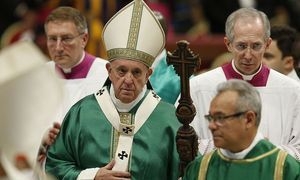
Extract from Gerard O’Connell, October 27, 2019, America, The Jesuit Review, CNS, 27 October 2019
“The cry of the poor is the cry of hope of the church,” Pope Francis declared in an inspiring and challenging homily at Mass in St Peter’s Basilica, on Oct. 27, at the close of the three-week-long Pan-Amazonian synod that may well prove to have been a turning point in the history of the church in the region and perhaps also worldwide. He repeated the words, “the cry of the poor is the cry of hope of the church,” as he commented on the Gospel story of the Pharisee and the tax collector that had just been read. “How many times, even in the church, have the voices of the poor not been heard and perhaps scoffed at or silenced because they are inconvenient,” he remarked. But, he added, “in this synod we have had the grace of listening to the voices of the poor and of reflecting on the precariousness of their lives, threatened by predatory models of development.”.....(more). Photo: America, The Jesuit Review, CNS Paul Haring
Extract from Gerard O’Connell, Luke Hansen, S.J. America, The Jesuit Review, 26 October 2019
The synod on the Pan-Amazonian region concluded its work on Saturday afternoon, Oct. 26, by approving all 120 paragraphs of its final document (available in Spanish only) with the necessary two-thirds majority vote, including the one proposing the priestly ordination of “suitable and esteemed” married men who are permanent deacons in communities of this vast region. While that latter proposal attracted much of the media attention and had the most votes against it (128-41), the most important thing to emerge from the synod was the unequivocal commitment by the church in the nine countries of the Amazon region to seek new ways to preach the Gospel and to promote justice and stand in solidarity with its 34 million inhabitants, including some 2.5 million indigenous peoples in voluntary isolation, in defense of their rights to life, land and their cultures, and against all forms of violence and exploitation to which they are subject....(more).
Extract from CathNews, NCR Online, 25 October 2019
A proposed Amazonian rite in the Catholic Church is centred on Christ, an indigenous professor told a Synod briefing yesterday. Addressing concerns about the proposed Amazonian rite in the Catholic Church, Delio Siticonatzi Camaiteri, a member of the Ashaninka people and a professor from Peru, said that fears about the proposal are unwarranted because indigenous people seek unity and not division. “Do we (want to) have our own rites? Yes, we do! But those rites must be incorporated with what is central, which is Jesus Christ. There is nothing else to argue about on this issue! The centre that is uniting us in this Synod is Jesus Christ,” he said. Throughout the Synod, members discussed the possibility of incorporating local traditions and cultural elements in the liturgy. While there are nearly two dozen different rites in the Catholic Church, those critical of the proposal fear that it would introduce so-called pagan elements into the liturgy. Speaking to journalists at the briefing, Mr Siticonatzi said that he noticed those present seemed “a bit uncomfortable” and did not “understand what the Amazon truly needs” when it comes to establishing a new rite. “We have our own world view, our way of looking at the world that surrounds us. And nature brings God closer to us. Our culture brings the face of God closer to us, in our life,” he said. Nevertheless, he added, there are many who are “doubtful of this reality that we are looking for as indigenous people.” “Do not harden your hearts! Soften your hearts; that is what Jesus invites us to do,” he said. “We live together. We all believe in one God! At the end of it all, we are going to be united.”....(more). Photo: CathNews, NCR CNS Paul Haring
Extract from Christopher Lamb, The Tablet, 20 October 2019
Forty prelates travelled to the Catacombs of Domitilla to sign the 'Catacombs pact for a Common Home'. Several dozen bishops attending the Amazon synod have pledged to work for a prophetic Church dedicated to serving the poor during a ceremony on the burial site of some of the early Christian martyrs in Rome. Early on Sunday morning, 40 prelates, including two cardinals, travelled to the Catacombs of Domitilla, on the outskirts of the Eternal City, to sign the “Catacombs pact for a Common Home”. Significantly, lay people and women were also among the signatories. The historic declaration is a renewal of the 1965 pact signed in the same place by bishops attending the Second Vatican Council.
Extracts from Michael Koziol, The age, 20 October 2019
One of the country's most senior Anglicans has declared the church is in a new "crisis" over same-sex marriage as Melbourne Archbishop Philip Freier tries to calm a week of frenzied debate over whether LGBTQI people are welcome in the faith. Dr Freier, the Anglican Primate or head bishop, said crisis was "a strong word" and sought to downplay the question of sexuality and same-sex marriage as a "social issue" and a matter of conscience. His statement came in response to comments from Sydney's conservative archbishop Glenn Davies, who told The Sunday Age the Anglican church was "in a crisis" because some clergy wanted to alter its doctrine to become more accepting of same-sex unions. It followed an incendiary speech to the Sydney diocese's synod last week in which Dr Davies declared people who didn't ascribe to the doctrine should "please leave" the church. He said later his remarks were directed at "the bishops" and clergy, not "the people in the pews". The remarks were in part triggered by a vote of the Wangaratta diocese and its bishop John Parkes to bless (but not solemnise) civil same-sex unions. Dr Freier has referred that matter to the church's internal appellate tribunal.........Dr Davies told The Sunday Age same-sex attracted Anglicans were welcome in the faith, but did not shy away from saying that homosexual sex was a sin. He agreed with a controversial Instagram post by sacked rugby player Israel Folau proclaiming homosexuals and adulterers will go to hell. "If you don't believe in Jesus and follow his ways then you are going to hell," Dr Davies said. "It's imperative for me to warn people. It is a gospel issue, and we are about the gospel." "The national church should take this message: be faithful to the teaching of the Bible. Do not try to change the doctrine of our church. That is what I will not abide."....(more)
.jpg)
Link to video from Joseph Carmel Chetcuti, Anne Tudor and Malloy testimony from the Embolden Festival*. Republished here 20 October 2019
As part of the 2019 International Day of the Older Person, on 1st October during the Embolden Festival older LGBTI people shared their stories of faith and resistance – and the possibilities for spiritual wisdom as we age. The presenters describe how finding their core values enabled them to build the resilience they needed to get through extraordinary challenges, including challenges by the faith based institutions they placed their trust in. It also empowered them to take action to improve their lives and the lives of others. In this film Joseph Carmel Chetcuti, Anne Tudor and Malloy describe the importance of their Catholic Faith. *The Embolden Festival is primarily sponsored by The Department of Health, and other partners: the City of Port Phillip's Older Persons Consultative Committee, the National LGBTI Health Alliance's Silver Rainbow LGBTI Inclusive Ageing and Aged Care, the Victorian Government through their Multicultural Festivals and Events Program, Older Person's Advocacy Network, Elder Rights Advocacy, Elder Abuse Action Australia, and Communities of Respect....(HERE) Image: from video Stories of Faith and resistance Faith and Resistance video image 20191001
Extract from Opinion Piece, Thomas Reese, Religion News Service, National Catholic Reporter, 17 Oct, 2019
Vatican City — The synod of bishops meeting in Rome appears to be moving toward recommending the ordination of married men in the Amazon region. While no one can predict what the bishops will do, one Brazilian bishop recently estimated that two-thirds of the bishops at the synod will support ordaining "viri probati" — a church phrase meaning "married men of proven virtue." Another participant told Religion News Service that only a couple of the 185 bishops spoke against the idea during the first week of the synod. The three-week synod, which began Oct. 6, is composed mostly of bishops from the Amazon region but includes laity and religious, both men and women, as nonvoting participants. Among the lay participants are indigenous people from the area. The first week of the synod involved three days of four-minute speeches by the participants, followed by two days of small group discussions. The second week has two days of speeches, followed by another two days of small group discussions. Rumor has it that the synod will get Friday off while a committee attempts to draft recommendations that reflect the consensus of the synod. Next week, the final week, will be decision time, when the bishops will vote on the recommendations they want to make to the pope.....(more). Photo: Amazon Synod opening 7 Oct 2019 NCR AP Andrew Medichini 20191017

During the 10th General Congregation which took place on the afternoon of 14 October, the participants in the Special Amazon Synod continued their work. In addition to Pope Francis, there were 177 Synod Fathers present, as well as other auditors, experts and invited guests.
Extract from Vatican News, 14 October 2019
Vatican City. Rethinking ministry in the Church in the light of the parameters of synodality so that the Church might be more and more formed by the Word of God was defined as one of the challenges of the Church in the Amazon region. Several interventions given this afternoon in the Synod Hall highlighted this. The Word of God: The Word of God is an active and merciful presence; it is educative and prophetic, formative and performative. It underpins that challenge of integral ecology and can be a means for social, economic, cultural and political development and a new humanism. New ministers of the Word, including women, are needed to provide new responses to contemporary challenges. The Church must, therefore, invest in the formation of a well-prepared laity who, in a missionary spirit, will know how to proclaim the Gospel in every part of the Amazon. Providing an adequate formation for committed laity, it was noted, is also fundamental for promoting indigenous vocations to the religious life and ordained ministries. The role of the laity and women: It was also said in the Hall that the gifts of the laity need to be better expressed and appreciated in a ministerial Church. Thanks to the laity, the Church is manifesting itself as a Church moving outward, distancing itself from clericalism. One intervention in particular suggested that the question of the so-called viri probati and the discussion regarding ministries open to women should be treated in an Ordinary Assembly of the Synod of Bishops since this theme affects the universal Church. Others suggested that women could be included in non-ordained ministries, ministries intended as service, so as to guarantee the dignity and equality of women in the entire Pan-Amazonian territory. Such ministries could be, for example, that of presiding over celebrations of the Word, or leading the activity of a social-charitable nature. (more). Photo: Synod Hall during General Congregation Vatican News

Historic move designed to make clergy engage in 'mutual listening… and a taste for a shared mission'
Limited extract from Vincent de Féligonde and Céline Hoyeau, subscription Journal La Croix International, Global Pulse, 14 October 2019
France. For the first time in its history, the Catholic bishops' conference of France will open its plenary...(source). Photo: French plenary assembly opening of 2018 French Catholic bishops Lourdes La Croix International Laurent Ferriere Hans Lucas 20191014
Extract from Br Mark O'Connor FMS, Catholic Outlook, 11 October 2019
Dear Friends, I am sure some of you might remember that fine Australian film Strictly Ballroom. In it, there was an epic struggle going on. On the one hand, there were those convinced that there is only one model of ballroom dancing and hence their insistent and non-compromising mantra: “No new steps”. A young couple in the film, however, challenged this prevailing ideology and showed, in their actual dancing, that “new steps” are indeed possible. Well, there is a similar ‘dance’, this time a ‘dance’ of the Holy Spirit, going on in Rome at the moment. There is, however, one big difference. Today, in Rome, at the Synod of the Amazon, the young couple is represented by the successor of Peter, who has gathered an impressive, representative and diverse group of lay leaders, religious, theologians and Bishop pastors. These are people largely actually working in the field hospital of the Amazon. They are seeking, as the pilgrim people of God, to discern the Spirit and imagine new steps for the good of the people of God. They don’t necessarily have all the answers but there is a refreshing sense that the Spirit is breaking through. Certainly, new graces are being offered by these local churches. Graces that can also teach us much in the church in Australia. These synodal delegates are ironically, the real orthodox conservatives – because they want to conserve and apply the living Gospel to today’s realities! They understand that: “Traditionalism is the dead faith of the living; whereas Tradition is the living faith of the dead.” For them, the authentic tradition is dynamic and a river. For as Cardinal John Henry Newman (to be canonised in just a few days) famously pointed out: “To live is to change, and to change often is to become more perfect.”....(more). Photo: Pope Francis celebrates Mass opening Amazon Synod Catholic Outlook Shutterstock 20191110

Extracts from J. A. Dick, Another Voice, Being a Theologian, 11 October 2019
For observers of Christian history, and especially for Christians in the Catholic tradition, October 11th is an important date. Fifty-seven years ago today the Second Vatican Council opened in St. Peter’s Basilica In Vatican City. Between 2,000 and 2,500 bishops and thousands of observers, auditors, women religious, laymen, and laywomen gathered at St. Peter’s between 1962 and 1965. Pope John XXIII opened the Catholic Church’s windows for what was called “aggiornamento”: bringing the Catholic Church up to date. At the time, I was in my second year of college in Detroit and one of my professors, with a bit of dry humor, observed “the old pope is opening the windows and the winds of change will shake-up everything.”..........Post-Vatican II, we have our own contemporary theological challenges: How do we speak today about our experiences of the Divine? Who is God for contemporary believers? Two thousand years after he walked the earth, who is Jesus of Nazareth, raised from the dead, whom we proclaim Lord and Christ? And what does it mean to be a human person? And how do we develop and live a system of values that respects that humanity in all its cultural, historic, religious, ethnic, sexual, and gender varieties? And how do Christian believers collaborate to turn back the contemporary tide of racism, xenophobia, and authoritarian political leadership? These are our contemporary issues. With faith and fortitude, we can meet the challenge. As Vatican II said (using an inclusive language translation of the Latin text) in its Pastoral Constitution on the Church in the Modern World: “The joys and the hopes, the griefs and the anxieties of the men and women of this age, especially those who are poor or in any way afflicted, these are the joys and hopes, the griefs, and anxieties of the followers of Christ. Indeed, nothing genuinely human fails to raise an echo in their hearts….” The windows are op[em.... Happy Birthday Vatican II.........(full article). Photo: Vatican II 11 October J A Dick Another Voice

Speaking to journalists after a Vatican press briefing yesterday, retired Bishop Erwin Krautler of Xingu said, “I guess that (of) the bishops who are in the Amazon region, two-thirds are in favour of the ‘viri probati’
Extract from CathNews, CNS, 10 October 2019
Speaking to journalists after a Vatican press briefing yesterday, retired Bishop Erwin Krautler of Xingu said, “I guess that (of) the bishops who are in the Amazon region, two-thirds are in favour of the ‘viri probati’.” Several bishops and other speakers at the Synod of Bishops for the Amazon proposed the ordination of married men, preferably elders in their respective communities, as a solution for remote communities that often go from one month to up to one year without the celebration of the Eucharist. During the Synod’s morning session on October 8, the Vatican said, several bishops proposed the ordination of married “viri probati” and at least one suggested the Church could “evaluate over time whether this experience is valid or not.” At the briefing, Bishop Krautler said that when it comes to ordaining married men of proven virtue, “there is no other option.” “The indigenous people don’t understand celibacy; they say that very openly and I see it,” the bishop said. “When I go to an indigenous village, the first thing they ask is, ‘Where is your wife?’ And I tell them, ‘I don’t have one.’ Then they look at me with pity.” Bishop Krautler added that there are thousands of indigenous communities in the Amazon that “do not celebrate the Eucharist except perhaps one, two or three times a year.” “The Eucharist, for us Catholics, is the source and summit of our faith. And these poor people are practically excluded from the context of the Catholic Church,” he said. Bishops in favour of ordaining married men, he said, “are not against celibacy. We just want these brothers and sisters of ours not to have just a celebration of the word but also the celebration of the Eucharist.” Several speakers at the Synod also proposed ordaining women deacons....(more). Photo: Bishop Erwin Krautler CNS Paul Haring CathNews
The Prince of Wales will lead the UK delegation. The Queen no longer travels abroad, so he is the highest-ranking royal who could attend
Extract from Liz Dodd, The Tablet, 9 October 2019
Thousands of Catholics from England and Wales are expected to travel to Rome for the canonisation of John Henry Newman this weekend, when he will become the first English saint of modern times.
As many as 20,000 tickets have been reserved, with a large number of pilgrims attending from the English Oratories, which were founded by Cardinal Newman. They include 50 from the Oxford Oratory, about 40 from Manchester, 20 from Birmingham, and a group from the York Oratory, which is still in formation. The Schola Cantorum of the London Oratory School will sing at the Canonisation Mass on Sunday. The Archdiocese of Birmingham, where Newman founded the first English Oratory, is sending nine different groups, including about 30 pilgrims from the cathedral, 30 from the Oratory schools, and groups from the Maryvale Institute and Newman University. As well as individual adult pilgrims, the Archdiocese of Westminster said that 25 young adults were travelling from London. The Prince of Wales will lead the UK delegation – because the Queen no longer travels abroad, he is the highest-ranking royal who could attend – along with HM Ambassador to the Holy See, Sally Axworthy. Cardinal Vincent Nichols will lead a delegation of 17 English and Welsh bishops, including the Archbishops of Birmingham, Southwark and Cardiff....(more) Photo:Tim Rooke PA Archive PA Images The Tablet

Extract from Andrew Hamilton, Eureka Street, 9 October 2019
Extract from Andrew Hamilton, Eureka Street, 9 October 2019
The core of Getting Back on Mission is a submission made to the Australian Plenary Council which will meet in 2020 and 2021. It was composed by Catholics for Renewal, a group of lay Catholics who have for many years pressed the need for reform within the Catholic Church. It is a valuable resource, comprehensive in its discussion of challenges affecting the Catholic Church and detailed in its proposals for meeting them. It also includes statistical information about the current situation of the Australian Church and the scope of plenary councils. Catholics for Renewal, Getting Back on Mission: Reforming our Church Together. For Catholics who are interested in the Australian Church, its future and the council, it is essential reading. Whether or not they accept the shape of its argument, it offers a comprehensive list of issues and a view of their underlying causes that need to be grappled with. Given its focus on governance, it may also be of interest to a wider audience. Many of the strains and signs of dysfunction it finds in Church governance and internal are similar to those identified in public life in Australia and internationally. At the heart of Getting Back on Mission is the claim that the Catholic Church has gone off-mission. The strongest evidence for this claim, and a major source of the passion infusing the book, is the extent of child sexual abuse by priests and religious over many years, the appalling suffering of its victims, its cover-up by Catholic Church leaders and the consequent loss of credibility of the Catholic Church. The book claims that the root of this dysfunction lies in seeing the church as God's mission rather than as an instrument of God's will for the world. When the church is made the main show, its structures are sacralised in law and in institutional relationships, hierarchical boundaries are reinforced, and the good name of the church becomes sacrosanct. This culture breeds a silence in which crime and cover-up can flourish. The source of healing conversely will be to enshrine in church practices and governance the shared mission of all Catholics to embody the Kingdom of God within the changing conditions of their own times. In that process the consensus of the faithful, lay as well as clerical, will guide the Catholic Church in discerning how to read and respond to the signs of our times. The submission supports this understanding by reference to the Second Vatican Council. The first section of the book considers God's mission and the Australian context in which that mission must be embodied. In the following sections, each of which is followed by detailed recommendations, it reflects on the proper relationships between laity and clergy, on church governance, on pastoral leadership and parish ministry, and on the process and procedures of the Plenary Council. The recommendations identify areas where change is needed and outline transparent procedures and structures in which laity and clergy have an active part. The value of the recommendations lies in the thought that underlies them and the concreteness of the proposals made......(more) Image: Eureka Street, Catholics for Renewal, Getting Back on Mission: Reforming our Church Together, Garratt Publishing, ISBN9781925009651
Pope Francis doubles down on reforming the Church and the Vatican
Limited extract from Robert Mickens, Rome, Letter from Rome, Subscription journal La Croix International, 4 October 2019
Vatican City. There's a lot of commotion in and around the Vatican right now. It consists mostly of the angry rumblings of traditionalist Catholics who don't particularly care for the way Pope Francis is leading the Church. Then there are the retaliatory rebukes of the pope's most eager supporters. This has only increased the volume. But, if you can believe it, this acrimony – which has long been on ugly display in the realm of social media – might be just a bit of relative calm before a really fierce storm. And the...(source), Photo: Amazon bishops La Croix International Photoshot Maxppp
Extract from Elise Harris, Senior Correspondemt, Crux, 4 October 2019
ROME - In the first of many counter-events to this month’s Synod of Bishops on the Amazon, key critics of Pope Francis blasted him for allegedly promoting widespread heresy in the Church, saying his agenda for the 3-week gathering is “demonic” and calling on him to resign. “With all respect owed to the ecclesiastical authorities, I accuse all those who approved or who will approve the Instrumentum Laboris of the Amazon (synod) of polytheism, or more specifically, poly-demonism, because as the psalms say, all divinities of the gentiles are demons,” Italian journalist Roberto de Mattei said, speaking at a high-profile event in Rome. Director of Italian Catholic news site Corrispondenza Romana, de Mattei issued an appeal to “the bishops who are still Catholic to raise their voices against this scandal.” “If their silence continues,” he said, “we will continue to seek the intercession of the angels and Mary, Queen of Angels, to save the Church from every from of reinvention, distortion and reinterpretation.” De Mattei was among nine panelists participating in an Oct. 4 counter-event to the Synod of Bishops on the Amazon titled, “Our Church - Reformed or Deformed?” Titled “New Paths for the Church and for an Integral Ecology,” the Oct. 6-27 synod will draw some 300 Catholic leaders from the Pan-Amazonian region to discuss issues including the rights of indigenous populations, land rights, migration, corruption, the Church’s missionary efforts in the area, local liturgy and sustainable development. Organized by a conservative group called “Voice of the Family,” Friday’s panel is one of several counter-events to the synod being organized for October. It drew high-profile critics of Francis, including major English-speakers John-Henry Westen of LifeSite News and Michael Voris of Church Militant. De Mattei is among the most vocal Francis critics in Italy.....(more)
Benedictine sister talks about prophetic change, changing religious life
Extracts from Gail DeGeorge, Global Sisters Report,National Catholic Reporter, 4 October 2019
The Time is Now: A Call to Uncommon Courage.In her address, Chittister recounted her own naiveté in believing that change would come once people understood social imbalances, the second-class status of women, the marginalization of people of color and the theological deviance of clericalism. Then, she said, "I got it." "There really are forces that are working consciously against cultural change," she said. "Built into society, it seems, is the wanton destruction of creation for the sake of personal profit. The casual dismissal of scientific concern for the care of the Earth, the ongoing destruction of nature for money, and the gall to enshrine a minimum wage rather than provide a living wage, and under it all, a new political goal: the increasing concern by politicians to create a political base for themselves in order to retain their seats for years rather than secure the future of the country." Moreover, in religion, the one arbiter of ethical standards, we have "even managed to domesticate Jesus. ... We have made him 'sweetness and light' in a nuclear world," she said. "The problem is clear: In a world such as this, we have lost sight of ourselves as Christians. We have simply abandoned the awareness of what we are required to do about it." The popular embrace of "Jesus the healer" has obscured the more radical Jesus, who challenged the status quo and religious leaders of his time, Chittister said. "We live in an era that accepts half of what it means to follow Jesus," she said. "We want our religion in a spiritual Jacuzzi, a feel-good spiritual world." "We do mercy very well, but the fact is that the model of Jesus the healer is only one-half of the Christian dispensation," she said. "The rest of the Christian mandate is model of Jesus the prophet," she said. "This is the Jesus who spoke justice as well as mercy ... This is the Jesus who cleared the money-changers out of the temple. How? By turning the tables upside-down.''.......(more). Photo: NCR. Allan Johnson
Warsaw launch of Getting back on Mission.
Friday 4 October 2019
Following the Melbourne launch of Getting Back on Mission by Francis Sullivan the book has now since been launched in Warsaw, at a meeting of the International Church Reform Network. Plans are underway for two further Australian launches, in Sydney and Canberra.
From the left at the Warsaw launch are: Helmut Schüller (Pfarrer-Initiative, Austria - who launched the book), Deborah Rose-Milavec (Future Church, USA) who warmly endorsed it, David Timbs (Catholics For Renewal) and Ian McGinnity (ACP Australia).

Catholic bishops around the world are responding in various ways to the crisis the Church is currently facing. Some have tried to show that the bishops in the United States and Germany are doing so in a similar fashion. But this is a false equivalence. On one side of the Atlantic, the US bishops, whose predecessors eagerly embraced the reforms of the Second Vatican Council (1962-65), have refused to even imagine how synodality can be implemented today at the local and national levels. Internal divisions have effectively paralyzed the national episcopal conference. On the other side of the pond, the German bishops are doing just the opposite. They are charging ahead, as they did with their national synod of 1971-75, to make sure collegiality and synodality are not just empty slogans. The tendentious effort to equate two very different ways that two churches are trying to deal with the present ecclesial crisis reveals a bigger issue. It is the fundamental misunderstanding, pushed especially by legal-minded and self-described “orthodox Catholics”, about the governance system of the Church and the limits of what can and cannot change. These same Catholics continue to interpret Pope Francis’ efforts to usher in a synodal model for their Church within the strict boundaries of existing canon law. For sure, the ecclesiastical law is one of the reference points for understanding how to implement synodality. But it is not the only one. And it is certainly not the most important. Two examples from history highlight how non-monarchical elements have become part of the life of the Church with the approval of the institution and of the papacy.....(more)
Two of the cardinals leading the Synod of Bishops on the Amazon have made clear that the gathering will consider the idea of ordaining older married men to address the severe lack of priests across the nine-nation region.
Extract from CathNews, NCR Online, Friday 4 October 2019
In a press conference to present the October 6-27 Synod, Cardinal Lorenzo Baldisseri and Cardinal Claudio Hummes focused on the serious implications of Catholics living without frequent access to the sacraments and the call of people in the Amazon that the Synod address the issue. Cardinal Hummes, the retired archbishop of Sao Paulo, Brazil, who is serving as the Amazon Synod’s relator general, said that up to 80 per cent of people in the region have “a limited sacramental life.” “Very few people receive the Eucharist and can have the celebration,” he said. To emphasise the importance of receiving Communion for a Catholic, Cardinal Hummes cited a 2003 encyclical by Pope John Paul II that said the Church “draws her life from the Eucharist.” Cardinal Baldisseri, who heads the Vatican Synod office, affirmed that the issue would be discussed. “It will be taken into consideration inside the assembly,” he said, citing the Synod’s working document, known as an instrumentum laboris, that brought up the request from people in the region for a discussion. “It is in the instrumentum laboris,” Cardinal Baldisseri. said “Therefore, the Synod fathers are free to express themselves, to discuss it.” The Church has maintained the practice of mandatory celibacy for priests for centuries, pointing to the need for ministers to be completely devoted to their work. It makes exception, however, for priests who belong to Eastern rites or who become Catholic after being ordained in other Christian traditions. The discussion of a regional allowance for married priests in the Amazon has sparked an uproar among a conservative minority in the Church, including some cardinals....(more)

During this period of school holidays in Australia our volunteer website manager will be away.
Edited Extract from ABC News, RMIT ABC Fact Check, 23 September 2019
The claim: Church and state have clashed over new laws in Victoria and in Tasmania (as well as similar laws being proposed in Queensland) that compel ministers of religion to report child sexual abuse to police. Senior Catholic clergy have said they would sooner go to jail than reveal what they hear during confession, which the church says must remain secret. But others say the confessional rules could be changed so that priests did not have to choose between obeying civil or church law, among them Father Kevin Dillon AM, a Victorian parish priest recognised for his work with abuse survivors.
He told ABC radio that the confession rules were not so much a teaching of Jesus as they were a practice, and were "not written in scripture". "The church makes the rules as to how the sacraments are enacted, and it is within the competence of the church to support its priests to not be put into this sort of situation by saying, in these sort of circumstances, well, the seal of confession need not apply." Is the confessional seal not mentioned in the Bible? RMIT ABC Fact Check investigates. The verdict. Fr Dillon's claim is a fair call.....(more). (A list of ABC News items on this is here)

Extracts from The Tablet, Catholic News Service, 20 September 2019
Thousands of documents relating to England's 19th-century convert-cardinal, Blessed John Henry Newman, are being released ahead of his 13 October canonisation, highlighting his role as a pastor and evangelist, said church experts. Although 32 annotated volumes of the cardinal's letters and diaries have been published over the past five decades, the new material includes letters and correspondence to the future saint. "Up to now, we've had only half his correspondence, with just fragments of letters he received, so this will greatly improve ... understanding of the complex issues he dealt with," said Paul Shrimpton, an Oxford-based expert on Newman's educational theories. Father Ignatius Harrison, provost of Birmingham's Oratory of St. Philip Neri, said Cardinal Newman "wasn't just a lofty philosopher -- he was primarily a priest and prophet, who foresaw the difficulties facing Christianity in a secular world." "He was loved in his lifetime not because everyone had read his academic masterpieces, but because of his pastoral kindness to the poor and sick, as these collections graphically illustrate," Father Harrison said......John Henry Newman was raised in the Church of England, graduated and taught at Oxford University and served as vicar of its St. Mary's Anglican Church, 1828-1843. Having co-led the 1830s Oxford Movement, which sought to revive the Church of England's pre-Reformation beliefs and rituals, he joined the Catholic Church in 1845 and was named a cardinal by Pope Leo XIII in 1879. Besides the oratory, Cardinal Newman helped found a Catholic university in Ireland -- University College Dublin -- and was influential in Catholicism's revival in England after three centuries' repression and restriction. He wrote poetry, hymns and novels, while his major works on church history, ecclesiology, the rights of conscience and role of laypeople are widely believed to have anticipated the 1962-1965 Second Vatican Council.....(more) Photo:The Tablet, CNS, courtesy of Catholic Church of England and Wales John Henry Newman
John Costa, 20 September 2019
On Tuesday at University of Melbourne Newman College Francis Sullivan former CEO of the Truth Justice and Healing Commission launched the book Getting Back on Mission; Reforming our Church together. Published by Garratt Publishing the book is an updated version of the Catholics For Renewal Submission to the 2020 Plenary Council and has already been well reviewed by a number of Leading Catholics in Australia and around the world. Amongst many comments Francis praised the book as a comprehensive and thorough work of committed lay Catholics driven by their strong faith and Church background to contribute to necessary Church reform via recommendations to the Plenary Council. By virtue of the book's user-friendliness it will also encourage far wider engagement in discussion on necessary Church reforms through this process. He highlighted the importance of synodality and the Church becoming a good listener. Several attending the launch commented that through her chairing the launch Fiona Lynch highlighted the rarity of women leadership in the Church and through her comments conspicuously demonstrated the importance of balancing perspectives which the Church over the years has largely ignored. Dr Peter Wilkinson, President of Catholics For renewal said that "Pope Francis has said that now is the time “to be bold and creative in the task of rethinking the goals, structures, style and methods of evangelization”, and that any “proposal of goals without an adequate communal search for the means of achieving them will inevitably prove illusory”. “The important thing”, he has said, “is to not walk alone, but to rely on each other as brothers and sisters, and especially under the leadership of the bishops, in a wise and realistic pastoral discernment.”. The book will also be launched in Warsaw next week then later elsewhere in Australia. Getting Back on Mission: Reforming Our Church Together is Catholics for Renewal’s contribution to that important task of walking together in a communal search. Photo: Francis Sullivan launching Getting Back on Mission.
Extract from Chip Le Grand. The Age, 20 September 2019
For more than four years, the fate of Australia’s most powerful Catholic cleric rested on the word of a former choirboy. For police, for the courts and the church, it all came down to the truthfulness, credibility and believability of a single witness, alone and unsupported in what he alleged against George Pell. In an application lodged this week for special leave to appeal his case to the High Court, Pell’s legal team shifted ground. It is both a vindication of the choirboy and a last bid by Pell, now serving a six-year prison sentence, to have his child sex convictions quashed. George Pell’s next court date is likely to be on the second Friday of either November or December. George Pell’s next court date is likely to be on the second Friday of either November or December. The Cardinal’s lawyers no longer question the credibility of the man who first told police in 2015 that Pell raped him and sexually assaulted a friend in St Patrick’s Cathedral when they were 13 years old. They no longer dismiss Pell’s accuser as a fantasist or argue that the County Court jury should have done the same. Instead, they contend that both sides of this bitterly contested prosecution should co-exist; that Pell’s accuser can be believed and the Cardinal acquitted of all charges and released from jail. "Can belief in a complainant be used as a basis for eliminating doubt otherwise raised and left by unchallenged exculpatory evidence?" Pell’s senior counsel Bret Walker says, before answering his own rhetorical question. "Believing a complainant ... does not equate to the elimination of reasonable doubt otherwise raised." The president of the Victorian Bar Council, Matthew Collins, QC, says it is a nuanced argument which, if entertained by the High Court, will confront our assumptions about truth and lies, guilt and innocence. "In any way you look at it, it’s a challenge to the criminal justice system," Dr Collins tells The Age....(more)
Kinited Extract from Declan Marmion , Salvador Ryan, subscription journal The Tablet, 19 September 2019
The priesthood cannot be liberated from the shadow of clericalism that besets the Church without a radical change in the way men are prepared for ordination. A friend in a rural Irish parish recently recalled how a new parish priest soon got rid of Eucharistic ministers and banned women from the sanctuary. An elderly priest set in his ways? “No,” our friend replied. “He’s in his thirties and was ordained five years ago.” Some recently ordained men still think of the priesthood as an elite caste. This usually goes hand in hand with an authoritarian and legalistic frame of mind, a preoccupation with doctrinal precision and liturgical orthodoxy. Such attitudes are fostered in seminaries that encourage clericalism and patriarchy. Pope Francis regularly castigates “the sins of clericalism, careerism and authoritarianism”. New guidelines for the training of priests issued by the Vatican in 2016, The Gift Of The Priestly Vocation, attempts to dismantle these attitudes....(source)

Extract from David Albertson, Jason Blakely, America, The Jesuit Review, 19 September 2019
A new kind of Christian nationalism is gaining momentum in the United States. Around the country,evangelical Protestants are deepening their loyalty to President Donald Trump, who announced last October: “You know what I am? I’m a nationalist, O.K.? I’m a nationalist.... Use that word.” Yet it is not evangelicals but Catholic intellectuals who are helping to lead efforts to capitalize on the opportunity presented by Mr. Trump’s nationalism. Catholic involvement is especially prominent in two recent initiatives. The first was a manifesto published by First Things this March advocating a new style of conservatism that would, among other things, “embrace the new nationalism” and “jealously guard” the space opened up by the “Trump phenomenon.” Among the signatories were Patrick Deneen of the University of Notre Dame, C. C. Pecknold of the Catholic University of America and Sohrab Ahmari, an op-ed editor at The New York Post. The second initiative was the National Conservatism conference, which took place in July and was organized in part by R. R. Reno, the editor in chief of First Things. Catholic thinkers such as Mr. Reno and Mr. Deneen shared the stage with other politically conservative speakers such as Tucker Carlson of Fox News, the University of Pennsylvania law professor Amy Wax and Senator Josh Hawley of Missouri, a vocal Trump supporter. While theorizing about nationalism, the speakers celebrated the Trump insurgency and praised the president’s instincts on immigration.....(more) Photo: America The Jesuit Review
Extract from Eric Hodgens, Pearls & Irritations, John Menadue Blog, 19 September 2019
Cardinal Pell got his voice heard from prison. Furthermore, surrogate Pell voices are heard from bishops he has promoted in Sydney, Melbourne and Hobart. But, on three current issues polls show that most Catholics disagree with them. So, which voice is authentically Catholic? A Synod of Bishops for the Pan-Amazon Region will take place in Rome in October 2019. Its aim is to identify new paths for the evangelization of that region. The working document for the synod was issued in June this year. The main preoccupation of the synod is the Amazon and its people. The evangelization of the people has, in turn, raised some secondary issues such as the ordination of married indigenous men and the role of women. These secondary issues rang the alarm bells of the reactionary faction of the culture wars currently bedevilling the Catholic Church and, indeed, much of the Western World. Pell has been a prominent voice of the right-wing faction all his life – dogmatic and authoritarian. Though convicted and in jail for paedophilia, he has used a letter to his supporters to add his voice to opposition to the Amazon Synod. Pell’s style is reaction. That style echoes in statements of his proteges the archbishops of Sydney, Melbourne and Hobart. Recent Australian legislation has given them material for reaction on the three hot button issues: same-sex marriage, standardising abortion legislation and assisted dying. These are the issues that really get them going – not refugees, immigration or climate change. The episcopal voices are supported by ideological, right-wing activist groups such as Sydney-based Notre Dame University’s Institute for Ethics and Society, the JP II Institute in Melbourne, the Christopher Dawson Centre in Hobart. These institutes are part of a world-wide collection of similar organizations pushing the right-wing, ideological agenda. Italy has the Dignitatis Humanae Institute promoted by Steve Bannon. The USA has the Napa Institute promoted by Timothy Busch and supported by Archbishop Chaput of Philadelphia and an array of others including George Weigel. These movement are highly organized and well-funded. Polls show that, while Australian Catholics have mixed opinions on the morality of these issues, a heavy majority are against criminalising them. Catholics, in the main, appear to be at home in a pluralist, secular society, and judge that it is not right to force their opinions on others.....(more). Photo: Eric Hodgens
Extract from Chris Vedelago, Farrah Tomazin and Debbie Cuthbertson, The Age, 18 September 2019
The psychologist who worked with the Catholic church for three decades to screen candidates for the priesthood once characterised child abuse as “seduction” that would do little lasting harm to its victims. Ronald Conway, the Melbourne Archdiocese’s “consulting psychologist for religious vocations” tested applicants to the Corpus Christi seminary from 1969 to at least 2001, during which time 16 child abusers graduated as priests. Mr Conway himself was later accused of historical sexual misconduct by former patients of his private practice, though never charged or convicted. An investigation by The Age has exposed how some of the Catholic church’s worst paedophile priests shared victims, passed on details of vulnerable children, and worked together to conceal their crimes as part of informal networks of abuse. At the centre of a number of these clusters was Corpus Christi, where Mr Conway and psychiatrist Dr Eric Seal were the mental health gatekeepers. Mr Conway was largely responsible for formulating screening practices that led to many unsuitable candidates entering Corpus Christi training college and eventually becoming priests. One candidate told the royal commission he was classified as ....(more)
Extract from Media and Communications Office Catholic Archdiocese of Melbourne, Tuesday 17 September 2019
The Archdiocese of Melbourne was approached by The Age on Wednesday 11 September with questions concerning a number of historical assertions, some of which focused on Corpus Christi College, the Catholic Seminary for the Province of Tasmania and Victoria. The Archdiocese acted quickly to ascertain the facts of what was being claimed, and answered the newspaper on 13 September, working with a short deadline and limited information provided by the newspaper. On Tuesday 17 September The Age published a story in relation to this topic. Abusers were named, all of who are already known by the Church, and in many cases by civil authorities. A number are directly associated with the Archdiocese of Melbourne, while others were trained for a different Diocese or Religious Congregation. The article alludes to information about inferred behaviours to which the Archdiocese is not privy. Should new information be raised, the Church in Melbourne will examine any related claims thoroughly. Anyone with relevant information or concerns is encouraged to raise them with the relevant civil authorities.....(more)
A Catholic priest left a 14-year-old boy in a seminary common room with several other boys before another priest came and "selected" him for abuse, says an explosive new statement of claim.
Extract from Farrah Tomazin, Chris Vedelago and Debbie Cuthbertson, The Age, 17 September 2019
Some of the Catholic church’s worst paedophile priests shared victims, passed on details of vulnerable children considered easy targets and worked together to conceal their crimes as part of informal networks of sexual abuse hidden in Australian seminaries, schools and parishes. An investigation by The Age has identified for the first time that many priests involved in historical sexual abuse of children did not simply act as individuals but formed clusters, or paedophile rings, throughout Victoria, from the western district to the Gippsland region and in suburban Melbourne. This interactive graphic reveals the extent of each priest’s offending and the links between them.....(more)
Francis' comment about a 'schism' in the Church is courageous … but also unprecedented
Limied Extract from Guillaume Goubert, France, Editorial, subscription journal La Croix International, 12 September 2019
The sentence will remain in the annals of the life of the Catholic Church. Asked on the plane back from Madagascar about the risk of a rupture between the Holy See and American Catholicism, Pope Francis replied very calmly: "I am not afraid of schisms." These are unprecedented words from the mouth of a pope, at least publicly. "Guarantor of the common faith," according to a beautiful expression by the late Cardinal Roger Etchegaray, the pope is supposed to do everything possible to maintain the unity of the Church. It is therefore assumed that this schism is an obsession for him. However, this pope tells us that he is not afraid of it, as an echo of the famous phrase of John Paul II during the Mass for the inauguration of his pontificate in October 1978: "Non abbiate paura (Be not afraid)!" Pope Francis' comments can therefore be interpreted as having two meanings, which are not exclusive of each other. On the one hand, the probability of a short-term schism does not seem to him to be major; on the other hand, he does not want to be dictated by such a risk. With that one sentence, Pope Francis is in fact trying to de-dramatize the oppositions that manifest themselves against him among part of American Catholicism but also, as he himself points out, "almost everywhere and also in the Curia." It also implicitly points the way to overcoming these tensions by stating that criticism is legitimate when it is expressed frankly. "Fair and open criticism is constructive" and "Better: It's loving the Church." A pope who publicly invites us to have a critical debate with him? There is no precedent for this either.....(source).
Extract from Tom Roberts, National Catholic Reporter, 12 September 2019
Washington — The Catholic Church has reached a crossroads. Its leaders can either change, become open and accountable, or maintain the status quo: an institution lacking transparency, wrapped in secrecy and beholden to a clerical culture that is at the heart of the institution's problems. That bleak assessment was made by Marie Collins, the Irish clerical sexual abuse survivor who was an original member of a papal commission dealing with the sex abuse crisis, and who said she is "hanging on by my fingernails." The scandal, she said in remarks Sept. 8 opening a five-city U.S. tour, is both systemic and global, and clericalism remains at its core. "The church is at a crossroads. It can either continue to behave as it has for centuries, protecting itself, or open up and become the church we all want it to be, the church that it should be." Collins, in a separate interview with NCR following the news conference, expanded on her understanding of clericalism and how it played into her decision to resign, after serving for three years, from the Pontifical Commission for the Protection of Minors. During the past 20 years, she said, the church "has been reactive" and "has not changed one single thing unless forced to by survivors and those in the media. ... I don't believe the church has made any changes of its own volition." She made her remarks at the United Methodist Building on Capitol Hill at the outset of her tour, titled, "A Crisis of Culture: Seeking Justice to Reclaim the Church." Comparing the task facing the church to the Herculean labor of cleaning the Augean stables, Collins said she believes significant change can occur only with continuous pressure "by lay people who love the church." Her time of service on the newly formed papal commission from 2014 to 2017 provided a rare look for a lay woman at the workings of the Roman Curia, the Vatican congregations and offices comprising the highest levels of governance in the church. She came away from that experience, she told NCR, convinced that "it's like a giant boys' boarding school." She described her time on the commission as a series of frustrations and realizations that some in the Curia were intent on stifling the group's work from the outset. She said the first meeting at the Vatican turned out to be a harbinger of what was to come. The room where it was held contained a bare table and chairs. "No pens, no pads, not even water," she said. When she asked who was going to take minutes of the meeting, she said the cleric secretary answered there was "no one in the Vatican available to take minutes."....(more)
Extract from CathNews, The Age, 12 September 2019
The Victorian Government says it hopes it does not have to jail priests who fail to report child abuse revealed during the sacrament of confession. The state’s Parliament passed laws on Tuesday carrying sentences of up to three years for failing to report abuse, but Premier Daniel Andrews said yesterday that he did not know of any convictions under Victoria’s broader mandatory reporting laws, in place for 25 years. Mr Andrews said the laws, and the new legislation passed on Tuesday, were intended to create a culture in which all abuse or mistreatment of children was reported, regardless of how it came to light. He said the bill, which passed the upper house on Tuesday night with bipartisan support, was intended to send a message all the way to the top of the Church in Rome. “The most important thing is to send a message that the law is to be taken seriously, if people don’t obey the law, then the penalties are very significant,” he said. “The culture is one where people have taken the laws and their responsibilities in terms of mandatory reporting very seriously.” The changes will bring religious leaders into line with police, teachers, doctors, nurses, school counsellors and youth justice workers who are required to report child abuse to authorities. “The special treatment for churches has ended and child abuse must be reported,” Child Protection Minister Luke Donnellan said in the wake of Tuesday night’s Parliamentary vote....(more). Photo CathNews, ABC Radio
Extract from CathNews, CNS, 11 September 2019
Pope Francis told reporters he hoped and prayed the Catholic Church would not experience a new schism, but human freedom means people always have had and will have the “schism option”. “I pray that there not be schism, but I am not afraid,” Pope Francis told reporters flying from Africa to Rome with him yesterday. Schisms have occurred throughout Church history, he said, and one thing they all have in common is having such a focus on an ideology that they begin reading Church doctrine through the lens of that fixation. A schism is triggered when “an ideology, perhaps a correct one, infiltrates doctrine and it becomes ‘doctrine’ in quotation marks, at least for a time,” he said. As an example of ideology, the Pope cited those who say, “The Pope is too communist” because of his criticism of unbridled capitalism and its negative impact on the poor. “The social things I say are the same things John Paul II said. The very same. I copy him.” When ideology takes the place of doctrine, he said, there is the danger of a split in the Christian community. Pope Francis said small groups of Catholics in the United States are not the only people who criticise him — there are even people in the Roman Curia who do — but he tries to learn from the criticism and to find a way to dialogue with critics who are open. “Criticism always helps,” Pope Francis said. “When one is criticised, the first thing to do is to reflect, “Is this true, not true, to what extent” is it valid?....(more). Photo: Pope Francis Mozambique CNS Paul Haring CathNews
Extract from Christa Pongratz-Lippitt, The Tablet, 11 September 2019
Woelki said he believed the new synodal procedure 'holds great dangers – above all the danger of splitting the the German Church' German bishops at loggerheads over plan for church renewal. The German bishops are at odds over the “binding synodal procedure” they decided to adopt at their plenary in March this year, designed to reduce clerical power and address clerical sexual abuse and the celibacy rule. On 29 August the bishops’ conference confirmed that four forums ( “Power, Participation and Checks and Balances”, “The Priestly Mode of Life”, “Sexual Morality” and “Women in Church Service and in Church Offices”) would be led by a bishop and a lay Catholic. However, on his return from a visit to the United States, Cardinal Rainer Maria Woelki of Cologne warned that the synodal procedure could put community with the World Church at stake and split the German Church. In an interview in the Cologne Kirchenzeitung, he said he was “sceptical” about the procedure, fearing that “it holds great dangers – above all the danger of splitting the the German Church”. In his letter to the German Catholics in June, Pope Francis had especially asked the German Church to remain in union with the World Church and with the Catholic faith, he recalled. Catholic Churches in the US were grappling with the same problems as the German Church, but he had the impression that the answers they had arrived at were “not attempting to go it alone”. The Bishop of Mainz, Peter Kohlgraf has defended the synodal procedure. At a celebration for lay pastoral assistants in Mainz Cathedral, where the synodal procedure meetings are to be held, he recalled that the procedure had not been decided on “for fun but against the background of terrible crimes” committed by priests....(more). Photo. The Tablet CNS photo Harald Oppitz KNA
Extracts from Noel Towell and Simone Fox Koob, The Age, 11 September 2019
The Victorian government says it hopes it does not have to jail priests who fail to report child abuse revealed in the confession box. The state's Parliament passed laws on Tuesday carrying sentences of up to three years for failing to report abuse, but Premier Daniel Andrews said on Wednesday morning that he did not know of any convictions under Victoria's broader mandatory reporting laws, in place for 25 years. The Premier said the laws, and the new legislation passed on Tuesday, were intended to create a culture in which all abuse or mistreatment of children was reported, regardless of how it came to light. Mr Andrews said the bill, which passed the upper house on Tuesday night with bipartisan support, was intended to send a message all the way to the top of the Catholic Church in Rome. "The most important thing is to send a message that the law is to be taken seriously, if people don’t obey the law, then the penalties are very significant," the Premier said.......The Catholic Church has insisted priests would be obliged to defy the laws, with Melbourne Archbishop Peter Comensoli previously stating he was prepared to go to jail rather than break the confessional seal. "For Catholics, confession is a religious encounter of a deeply personal nature. It deserves confidentiality," he said in August.....A spokesman said Archbishop Comensoli would not be responding publicly to the new legislation on Wednesday, and referred The Age to the Archbishop's August remarks......The introduction of the legislation follows a recommendation in the 2017 final report of the Royal Commission into Institutional Responses to Child Sex Abuse that clergy and confession no longer be exempt from mandatory reporting....(more)

Extract from CathNews NZ, CNA 9 September 2019
Cardinals Walter Brandmüller and Raymond Burke have both written to fellow members of the College of Cardinals raising concerns about the document. Some points…seem not only in dissonance with respect to the authentic teaching of the Church, but even contrary to it,” Brandmüller, who is a German prelate wrote. Parts of the working document are heretical, he says. Noting what he calls the document’s “nebulous formulations” Brandmüller pointed to topics the synod will focus on. These include a proposal to create new ecclesial ministries for women and another enabling the priestly ordination of the so-called viri probati – married men of good reputation, who could act as priests in places where there are none. Brandmüller says these topics’ inclusion raises “strong suspicion that even priestly celibacy will be called into question,” He also said Cardinal Claudio Hummes’s appointment as the president of the synod means he “will exercise a grave influence in a negative sense,” which presents “a well founded and realistic concern”. He said Brazilian emeritus bishop Erwin Kräutel (who is a long-time proponent of married priests) and Franz-Josef Overbeck of Germany are of concern.....(more). Photo: CathNews NZ CNA
Extract from Media and Communications Office, 8 September 2019
What makes for a successful Ordained Minister, many ask today? What does a priest or deacon need to succeed? Perhaps we would all hope that our Ordained Ministers come with a certain set of attributes and capacities: a skilled wordsmith of the Gospel; a man of faith, intellect and spiritual depth; someone accomplished in liturgical and pastoral knowhow; an experienced steward of God’s grace. All of these things would indeed be good to have, at least to an adequate extent, in all our bishops, priests and deacons. The problem with this way of thinking – in terms of success or failure, of achievement or lack thereof – is that it is not the question Jesus asked of those he commissioned to be his ministers. On the night before his Passion, at the Last Supper, the Lord asked instead: have you gone out to bear fruit, fruit that will last? This is the ‘great commission’ given to priests and deacons by the Lord, as he prepared to lay down his life for his friends: to go out with their lives; to be fruitful in their mission; and to be a lasting gift that will continue to nourish. To go out. For us who are ordained, our lives are not meant to be centred on ‘coming home’, as would appropriately be said of a family man. Ours is not an inward calling, but an outward one. We are commissioned by the Church to be on the move, and to be with others. It is why Jesus couched the commissioning of his first priests in the language of friendship, and not servanthood. You cannot be a gospel friend to others if you are only ever waiting for others to come to you for the sacramental or pastoral services you provide.....(more). Photo: Melbourne Catholic, CAM
Extract from David Timbs, Pearls & irritation, John Menadue blog, 9 September 2019
Peter A Comensoli has been the Catholic Archbishop of Melbourne for just on a year. So far he has demonstrated very little understanding of the disastrous situation he inherited. Nor has he shown any clear indication of the kind of vision and leadership needed to navigate a way though. For the twenty year administration of Archbishops George Pell (1996–2001) and Denis Hart (2001–2018) there is no substantive public record of how either of them personally assessed the state of the diocese committed to their care and the pastoral problems they faced. Nor is there a similar record of the pastoral plans they formulated to deal with them. Neither published any annual reports of the diocese for public viewing, and the detailed 5-yearly Quinquennial Reports that they are required to forward to the Holy See have remained ‘top secret’, never to be revealed nor even to find a home in the archdiocesan secret archives. What we do have is the 1998 Statement of Conclusions prepared by the Australian bishops (including Pell) and several high-level officials of the Holy See which, while purporting to be an accurate account of the state of the Church in Australia, made not a single mention of the clerical child sexual abuse that was then wreaking havoc throughout the nation. In July, 2011, Pell boasted to his fans in Cork, Ireland that: "Let me now explain what I have tried to do in Australia. First of all I had to deal with the abuse scandal and in this I was given some very good advice from a former Supreme Court Judge. He told me that the scandals would bleed us to death year after year unless we took decisive action.. So we did clean it up; we set up an independent commission, we set up a panel to provide counselling and a system to pay compensation — and please God the worst of it is behind us." While Pell in particular deconstructed the Archdiocese of Melbourne, both he and Hart did everything they could to block and stall the implementation of the diocesan structures for the synodality and co-responsibility recommended by Vatican II. Neither wanted a diocesan pastoral council (recommended but not mandated by Vatican II) nor a diocesan synod (‘Let them flourish with vigour’ said Vatican II), the last being held in 1916!....(more)
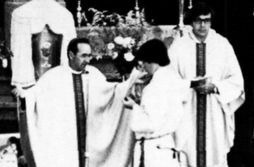
Extract from Melissa Cunningham and Andrew Thomson, The Age, 5:35pm 6 September 2019
The Catholic Church has accepted legal responsibility for the sexual abuse of a nine-year-old boy by notorious paedophile Gerald Ridsdale in a significant case which could open the floodgates for victims seeking compensation. After denying any knowledge of Ridsdale's offending before the boy was raped in a confessional box at Mortlake in 1982, lawyers for the church on Friday accepted an amended statement of claim from the victim in the Supreme Court – in effect admitting legal liability for his crimes. A 10-day civil trial scheduled to begin on January 29 next year will now focus primarily on the amount of damages the church will pay the victim. A mediation hearing will be held on October 15. The victim, identified in court under the pseudonym JBC, is suing Ballarat Bishop Paul Bird for negligence on behalf of deceased former bishops James O’Collins and Ronald Mulkearns. In defence documents submitted to the court, Bishop Bird accepted that Bishop Mulkearns breached his duty of care to the victim because he knew about a complaint of Ridsdale sexually abusing a child at Inglewood in northern Victoria in 1975, seven years before JBC was raped. "We are pleased that the Catholic Church has admitted liability for the sexual abuse of our client by Gerald Ridsdale," JBC's lawyers Judy Courtin Legal said on Friday. "We believe this is the first time in Victoria that the Catholic Church has admitted that it failed to protect a victim of child sexual abuse and that it is therefore legally liable.........Ridsdale admitted to sexually assaulting 65 children – both boys and girls – throughout Victoria in the 1960s, 70s and 80s, but it is believed the true number of his victims could be in the hundreds. He has been sentenced five times since 1993 and is in prison at the Hopkins Correctional Centre in Ararat. JBC is one of several victims mounting legal cases against the Ballarat Archdiocese over Ridsdale's offending. The total payouts to his victims alone are expected to run into millions of dollars....(more). Photo: The Age
Extract from Giselle Wakatama , Liz Farquhar and Madeline Lewis, ABC News,ABC Newcastle, updated 6:58pm 6 September 2019
Secret findings from a probe into alleged Catholic abuse cover-ups in the NSW Hunter Valley have identified credibility issues among clergymen within the upper echelons of the church. The Special Commission of Inquiry into allegations of a cover-up of child sexual abuse claims in the Catholic diocese of Maitland-Newcastle released damning findings in 2014. At the time, only three of the four volumes of the report were released by Commissioner Margaret Cunneen SC. The fourth volume included confidential material containing findings that the inquiry heard could lead to criminal charges being laid against a senior Catholic Church official....(more)
Friday 6 September 2019
Extract from Media and Communications Office, Melbourne Catholic, 6 September 2019
After an extensive recruitment process, Most Rev Peter A Comensoli, Archbishop of Melbourne, has announced the appointment of Ms Teresa Rhynehart as Director of Mission for the Archdiocese of Melbourne. Reaching out to over 1.1 million Catholics across broader Melbourne, this senior leadership role is a new position that will spearhead a renewed and coordinated missionary endeavour in the Archdiocese by engaging and growing apostolic life and leadership throughout the faithful of Melbourne. With recent experience in leading and implementing mission integration through St John of God Healthcare (South East Sub Acute Hospitals), leadership with the St Vincent de Paul Society, and over eight years as both Director and Assistant Director of mission agencies within the Archdiocese, Ms Rhynehart brings both a deeply personal and highly professional commitment to the witness of the Christian life today. Most Rev Peter A Comensoli said that he was delighted that Ms Rhynehart has accepted the position of Director of Mission. “Teresa is an outstanding candidate and has demonstrated a clear understanding and involvement in setting God’s People on a missionary footing.” “Our missionary focus is extensive, and works to bring renewed life to our families, our youth, our parish communities and the marginalised amongst many other outreach and engagement areas...(more)
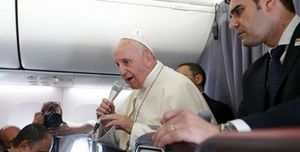
Extracts from CathNews, Crux, 5 September 2019
Pope Francis said he is “honoured” by the fact that a group of conservative Catholics from the United States attack him. The Pope was speaking aboard a papal flight to Mozambique, the first stop of a three-nation swing through Africa, when he was presented a new book on conservative opposition to the papacy written by a French reporter on the flight. “For me, it’s an honour that Americans are attacking me,” Francis told La Croix‘s Nicolas Seneze, author of How America Wanted to Change the Pope.........After the Pope’s comments, Vatican spokesman Matteo Bruni told journalists on the flight that “in an informal context the Pope wanted to say that he always considers criticisms an honour, particularly when it comes from important thinkers and, in this case, of an important nation.” A long-time Vatican reporter from the French Catholic daily, Seneze told the Pope that he wanted to explain the roots of American opposition to the Argentine, which has the support of several right-wing news outlets. In his book, Seneze names EWTN, founded by the late Mother Angelica, and Canada-based LifeSiteNews. The criticism against Francis is based on his cautious opening to allowing the divorced and remarried to receive the Sacraments, his emphasis on the environment, his strong condemnation of the death penalty, and his criticism of the capitalist economic order championed by US conservatives. In his book, Seneze explains the origin of the hostility against Francis in terms of two documents by the Pope: Evangelii Gaudium, his first apostolic exhortation and considered the Magna Carta of his pontificate, and Laudato Si', an encyclical letter on the environment originally intended to ensure adoption of the 2015 Paris Agreement pertaining to climate change.....(more). Photo: CathNews, CNS Paul Haring
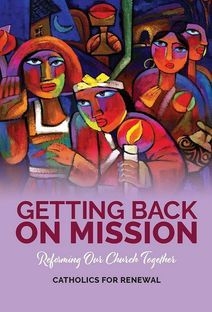
Extract from Paul Collins, Eureka Street,4 September 2019
One of the most extraordinary recent examples of commitment is the loyalty shown by many post-Vatican II Catholics to the church. Despite their steadfast support for the emphases of that Council, these lay Catholics, supported by many priests, are often seen as a 'nuisance' by senior church leaders whose real focus has been protecting their own positions and clericalist ideology. Their commitment has been further tested by the sexual abuse scandals and the abject failure of many bishops in dealing with them. Getting Back on Mission. Reforming Our Church Together (Garratt Publishing, 2019)The forthcoming Plenary Council (PC) of 2020/2021 will be a further test of the loyalty of these Catholics. How serious are the bishops when they call on Catholics to 'engage in an open and inclusive experience of listening, dialogue and discernment about the future' of Australian Catholicism? Will they really listen to those who have remained loyal to the teachings of Vatican II? Catholics for Renewal is one of several groups of Vatican II Catholics. It prepared a detailed submission for the PC and has now published that submission as a book, Getting Back on Mission: Reforming Our Church Together (Garratt Publishing, 2019). Robert Fitzgerald, one of the Royal Commissioners into Institutional Responses to Child Sexual Abuse, talks in the book about the causes of abuse and says that 'poor governance, inadequate leadership and an unhealthy culture that preferences secrecy and the church's own interests', as well as 'the absence of females and their participation in leadership roles', all contributed to the bishops' abject failure in deal with sexual abuse. Fitzgerald speaks of the hierarchy's 'fear of the non-ordained, especially women', and an 'arrogant assertion ... of the unique privilege of an ordained class'. In other words, clericalism. Fitzgerald emphasises especially the importance of 'good church governance'. This goes to the heart of Getting Back on Mission. As the title indicates, for too long the church has been 'off mission' in a self-engrossed, self-righteous, clericalist miasma that has led to massive disaffiliation of Catholics, a catastrophic fall in Mass attendance and sacramental practice. People feel alienated from bishops who, in turn, have retreated into their bunkers. To cap it all, faithful Catholics have had to witness the scandal of sexual abuse and the secretiveness of the bishops in dealing with this crisis. As I know from personal experience, anyone in the past who called attention to these issues was accused at best of exaggeration and at worst of being a 'Judas'. Getting Back on Mission correctly points out that until the church accepts good governance characterised by accountability, transparency, inclusion and a recognition of the equality of women, it will continue its culture of clericalism and secrecy. At the heart of the argument are the theological principles of the radical equality of all the baptised and the sensus fidelium, the intuitive sense that the faithful have to discern the belief of the church. That is why soon-to-be-saint John Henry Newman challenges the hierarchy to consult the lay faithful 'in matters of doctrine'.....(more). Photograph: Eureka Street, Garratt Publishing
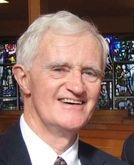
Extract from Eric Hodgens, Pearls & Irritations, 3 September, John Menadue website
The church is called to offer pastoral care to both offender and victim. A dilemma arises when the offender is an official of the church. Like it, or not, the victim must come first. A good counsellor of sexual abuse survivors listens empathetically but also critically, discerning whether the story is true. Jurors in a trial have a different task – to judge whether the story is true “beyond reasonable doubt”. A guilty verdict means that at least twelve people have heard the story, seriously evaluated it and unanimously judged it to be true beyond reasonable doubt. It is not enough for a critic to dismiss the story as implausible without evidence to the contrary. The twelve people, chosen by our legal system to judge George Pell, listened to the survivor’s story and watched him cross examined by the defence counsel. Note that, court officers aside, the jury were the only ones who heard the story and cross examination. In Victoria complainants in sexual abuse cases give their evidence and are cross examined in closed court. Opposing this story, the defence argued that it was virtually impossible for the offences to have happened and gave 13 reasons why. The jury considered, but did not accept, these opportunity excuses as cogent. They unanimously judged George Pell guilty. There has been plenty of critical post-trial commentary both here and overseas. Much is partisan in Pell’s favour. Andrew Bolt wrote “A man was found guilty not on the facts but on prejudice”. A bit rich from someone who has not seen the facts and is a poster boy for prejudice. So, journalistic comments about the implausibility of the event, such as that of John Allen in Crux, are uninformed and unprofessional. Cardinals don’t usually rape choir boys. But this boy told the jury that he did, and the jury believed him.......(more)
Edited Extract from Farrah Tomazin, The Age, 1 September 2019
Australia’s Catholic Church is under internal pressure to undergo a drastic overhaul following George Pell’s conviction, with its own members stepping up calls for the ordination of women, an end to clericalism and greater inclusion for people who are LGBTI or divorced. Less than two weeks after Pell lost his appeal to overturn a jail term for child sex abuse, prominent Catholics have warned that the case should serve as a wake-up call given how much influence the disgraced cardinal has had on the church. “A convicted paedophile has played a major part in the form of the Church we see today,” said Catholics for Renewal spokesman Peter Johnstone, one of the church’s strongest internal critics. “It can’t just be business as usual.” The push for change comes as an internal report - based on the input of more than 220,000 people - firmly demands radical reform at next year’s Plenary Council, the first such meeting in 80 years to discuss the future of the Catholic Church in Australia. Prepared for the Australian Catholic Bishops Conference, proposals in the report include more inclusion for divorced and remarried Catholics; better selection of priests; more involvement for lay-people; and an end to discrimination against LGBTI people....(more)

Extract from James Martin, S.J. America - The Jesuit Review, 30 August 2019
What would it mean for the institutional church to welcome L.G.B.T. Catholics? What would it mean for church leaders to help L.G.B.T. Catholics feel more at home in their own church? And how can this be accomplished in the context of Gospel values and church teaching? Three recent stories show how: one concerning a priest, one an archbishop and one a parish. The priest’s story is perhaps the most surprising. The Rev. Bryan Massingale, a highly respected theologian who taught for many years at Marquette University and now serves as professor of theological and social ethics at Fordham University, began a recent lecture with these words: “I come to this conversation as a Black, gay priest and theologian.” The lecture, entitled “The Challenge of Idolatry for LGBTI Ministry,” delivered at the Global Network of Rainbow Catholics in Chicago, encouraged his fellow L.G.B.T. Catholics to remember that they are “equally redeemed by Christ and radically loved by God.” Father Massingale’s public statement about his sexuality may seem inconsequential to some in the West. But the number of Catholic priests who are open about their homosexuality (and faithful to their promises of celibacy, of course) in a public way, despite several articles in the last few years, is still infinitesimally small. The Fordham theologian said that he was moved by being among so many L.G.B.T. Catholics at the conference who had suffered great persecution in their own countries. He told me in an email: I spoke to them, not just from my head, but also with my heart and from my soul. I wanted to show them how our faith is not only relevant to their struggles for justice, but a strength for the difficult and often dangerous work that they are doing. To do that, I needed to share my faith story, and how I came to accept myself as being created in God’s image as a Black gay man. I said what I said because people are suffering horribly because of who they are and how they love. And I couldn’t ask them to continue being courageous if I wasn’t willing to be courageous, too. Such openness makes the church more inviting, especially for L.G.B.T. people who wonder if there is a place for them. Examples like Father Massingale’s help them feel welcomed and loved. As he said, “I didn’t do this to ‘come out.’ But to let God’s love for us all to ‘come forth.’” “I didn't do this to ‘come out.’ But to let God’s love for us all to ‘come forth.’” A second gesture came in remarks by Wilton Gregory, the recently appointed archbishop of Washington, D.C. Archbishop Gregory is well known for his efforts to welcome L.G.B.T. people in his former archdiocese of Atlanta......(more). Photo: America. The Jesuit Review CNS photos

Extract from CathNews, The Age, Friday 30 October 2019
A Victorian MP has opened up about the sexual abuse his father suffered at the hands of a Catholic clergyman while taking aim at the Church’s refusal to comply with new mandatory reporting laws. Paul Edbrooke said he could not help but wonder how different his father’s life would have been if everyone who knew he had been raped by a clergyman as a teenager had been legally required to report the abuse. “Could my family have avoided the suicide attempts, the trauma and the heartbreak?” the Labor member for Frankston asked in State Parliament yesterday. Instead, the politician’s father Nick, now 64, received an apology letter from the Church one month ago. Mr Edbrooke read part of the letter during an emotional debate over new laws making it mandatory for priests to report abuse, including when it is revealed to them during confession. "Every child deserves to be safe, to be loved and cared for. I am so sorry that this is not your experience,” the letter said. “We humbly ask for your forgiveness.” “My Dad is a survivor, and he said that I could share this letter, if it assists Parliament to know that apologies are worth nothing, unless we follow them up with action,” he said. Mr Edbrooke then attacked Melbourne Archbishop Peter Comensoli for saying he was prepared to go to jail in defiance of the proposed laws, rather than breaking the seal of confession. Archbishop Comensoli has previously said priests should be mandatory reporters, but have similar protections to the lawyer/client relationship. Priests who refuse to report sexual abuse disclosed during confession will face up to three years in jail under the proposed laws introduced by the state government earlier this month. The Church said it supports mandatory reporting and encourages victims to report abuse to police but will not break the seal of confession – regardless of the legislation. Archbishop Comensoli has said the draft of the bill is “unworkable” and shows a lack of understanding about the act of confession, particularly the anonymity of penitents....(More). Photo: CathNews Facebook Paul Edbrooke MP
'If the structure is more important than the mission, we will never get anywhere,' says priest who works on parish renewal
Limited extract from Gauthier Vaillant, 8 April 2019, Global Pulse, subscription joiurnal La Croix International, 29 August 2019
Comparing the current working of Catholic parishes with the sinking of the Titanic? It takes nerve to make that comparison. But that's what Father James Mallon did on April 5 while speaking at an event hosted by a parish in the southern suburbs of Paris. "The parish system as we know it is going to collapse," the priest warned. "The quicker we accept it, the sooner we will be able to develop something new." With his Roman collar, rolled up sleeves and a biting sense of humor, Father Mallon, a Canadian priest who specializes in "pastoral transformation," did not spare the large audience of 800 people, including 150 priests, who gathered for a two day session with him. The author of an internationally successful book, "Divine Renovation Guidebook: A step-by-step manual for transforming your parish," Mallon talks about these issues regularly in the English-speaking world. But this was a first time for France. The event was organized by Alpha, an initiative founded in London to evangelize through a series of talks and discussions in churches, homes, prisons and other setting. A healthy church is a missionary church.....(more)
Two former seminary professors say the current system breeds an ambition for higher office known as "Scarlet Fever"
Limited extract from C. Colt Anderson and Christopher M. Bellitto, 4 April 2019, Commonweal, Subscription Journal La Croix International, Global Pulse, 29 August 2019.
As former seminary professors, we have looked upon the last several months of revelations about clergy sex abuse, cover-ups, and institutional infighting with the same disgust and sadness as our sisters and brothers—but we are not surprised. Though we honor and support the many good people who work and study in seminaries, we know that seminaries have played a significant role in the church's current crisis. It is essential to understand how priests and thus, ultimately, bishops are formed, especially the way they are enculturated into clericalism from their first days in seminary. It is the air they breathe there. Clericalism in seminary formation is explicitly singled out as a problem in the Synod on Youth's final document, approved in late October 2018, and it affects everyone in the church—it is a systemic and widespread problem. While not new in church history, of course, it is a particularly pressing concern during this time of scandal. Pope Francis has repeatedly targeted clericalism as the great enemy of ordained ministry today. You can easily see the career-climbers he warns about in seminaries. If you want to learn how to work your way into the clerical caste, watch these men. They are learning Italian, wearing cufflinks and cassocks, and don't at all mind being called "Father," even though they are still in studies......(Source).
Extract from Ruth Gledhill, The Tablet, 28 August 2019
The ceremony took place in a 'solemn, harmonious and orderly' atmosphere.
The North Church, a Catholic church that is one of the largest and oldest churches in Beijing.
The first bishop has been ordained in China since the “provisional agreement” with Beijing was signed on 22 September last year. The agreement, which allows the Pope to nominate bishops who had already been vetted by Beijing, was designed to pave the way for a united Church in China, bring together the Vatican-recognised “underground Church”, whose members were loyal first to Rome, and the “Patriotic Church” that professed loyalty to the state as well as to Rome. Antonio Yao Shun was consecrated Bishop of Jining/Wulanchab in Inner Mongolia in China on Monday this week, 26 August. Matteo Bruni, director of the Vatican Press Office, told journalists in Rome: “I can confirm that H.E. Mgr. Antonio Yao Shun, who has been consecrated Bishop of Jining/Wulanchabu, Inner Mongolia (China), received the Papal Mandate, as was also stated by the Ordaining Bishop during the ceremony yesterday, 26th August 2019." Experts on Vatican relations with China urged caution however, saying not too much should be read into the ordination which was already scheduled before the new provisional agreement was signed.....(more)
Whatever we may think of Pell, we are at a disadvantage in assessing his guilt or innocence and would be best advised to maintain a discreet silence
Limited Extract from Michael Kelly SJ, Australia, Subscription journal La Croix International, 26 August 2019
The Aug. 21 judgment of the Victorian Court of Appeal on Cardinal George Pell's effort to have his criminal convictions reversed has caused an international storm, much of it grossly uninformed. Pell's loyal apologists in Australia – few in number but very noisy – have either railed against the conviction or, like the Archbishop of Melbourne Peter Comensoli, just professed disbelief that their friend could be guilty of such crimes. Internationally, the reaction has been anything from balanced in some quarters to sheer exaggeration, as in the case of John Allen from Rome who, on little or no evidence from Australia, points to a "sizable swathe of Catholic opinion, encompassing both historic friends of Pell and enemies, which regards the charges upon which he was convicted as deeply implausible." Such views have a lot of reality to come to terms with. And what I find most dismaying is how much denial is evident after the announcement of the Appeal Court decision. My own view is simple: the longer the delay in providing the decision, the surer I became that Pell's appeal would be dismissed. If the Court of Appeal were to uphold the appeal and find him innocent — and the first thing the judges agree on after they have heard the appeal is to share who among them upholds and who will dismiss the Appeal — why would they keep him in jail for almost three months if they thought he should be released?.....(more)
Extract from Chris Lowney, Pearls & Irritations, John Menadye website, 28 August 2019
Pope Francis’s foremost priority should be top-to-bottom culture change in the Catholic Church, specifically: fostering a spirit of urgency, bringing new talent to all decision-making tables, and creating openness to radically new ideas.Without this thoroughgoing cultural transformation, a Church now enduring its worst crisis in five centuries will continue to deteriorate. Pope Francis’s foremost priority should be top-to-bottom culture change in the Catholic Church, specifically: fostering a spirit of urgency, bringing new talent to all decision-making tables, and creating openness to radically new ideas. Without this thoroughgoing cultural transformation, a Church now enduring its worst crisis in five centuries will continue to deteriorate. Worst crisis in five centuries? That’s not hyperbole. The grotesque horrors of the sex abuse scandals, in Australia as throughout the Catholic world, are surely the most hurtful wounds that the Church has inflicted (and suffered) in recent decades. But other signs of existential crisis have abounded, in dozens of countries: thousands of ministries have shuttered, young people show little interest in the Church, sacramental participation has waned, and the clergy ranks are shrinking, to name just a few challenges. None of these challenges and crises will be resolved by “more of the same.” Rather, the 21st century Church must forge an accountable, action-oriented culture, in at least three ways:.......(more)
Extract from Jack Waterford, Pearls & Irritations, John Mendue website, 27 August 2019
George Pell will be doing very well if he succeeds in getting the High Court to grant him leave to appeal after the Victorian Court of Appeal threw out his appeal against his conviction for child sex offences. Pell was convicted by a well- instructed jury; neither side had the slightest complaint about the judge’s instruction to the jury. The jury heard a lot of advocacy going over the evidence to explain why it should find Pell not guilty. Those submissions, put to them over several days by Australia’s greatest criminal law advocate, Robert Richter, QC, were repeated to them, perhaps more neutrally, by the trial judge. Earlier, the prosecutor had explained why the “obstacles” to conviction were not insuperable ones. The unanimous verdict by the jury, after several days of deliberations, implied that it had considered, and rejected, each of the arguments that Richter said made the crimes impossible, or so highly improbable as to demand a reasonable doubt. Richter retired from the case after the jury verdict. In his place to argue that the verdict was wrong was Brett Walker, SC, Australia’s foremost appellate advocate. The Pell defence fund, gathered privately rather than through the Catholic Church, was not short of legal firepower, or lack of opportunity to put its case, whether to the jury, or to four very experienced trial judges. The two judges in the majority in the appeal case were Anne Ferguson, Chief Justice, and Chris Maxwell, president of the Court of Appeal. The chief appeal point was that the verdict was “unreasonable, and unsafe and unsatisfactory”....(More)
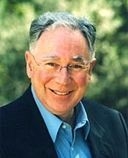
Extract from Paul Collins, Pearls & Irritations, John Menadue website, 26 August 2019
One persistent question that has been asked since the failure of Cardinal George Pell’s appeal last Wednesday has been: Why isn’t the Vatican acting to force him from the College of Cardinals and expel him from the priesthood? They moved with amazing speed in the case of Theodore McCarrick, Cardinal Archbishop of Washington, DC, after he was accused of sexual abuse of minors. Why isn’t the same speedy process happening with Pell? The first reason is obvious: Pell has every right to approach the High Court of Australia. But, as legal experts have pointed out, the bar for getting a hearing is extremely high. The reality is that special leave to appeal is only granted in those cases where a question of law of public importance arises, or where the interests of the administration of justice require consideration by the High Court. The High Court is not another higher court of appeal. Clearly the Vatican knows that Pell can approach the High Court, but I suspect it under-estimates just how high the bar is to get a hearing. Vatican decision-makers probably think it is just another higher appeal court. This is implied in the statement of Matteo Bruni from the Vatican Press Office when he says: “As the proceedings continue to develop, the Holy See recalls that the Cardinal has always maintained his innocence throughout the judicial process and that it is his right to appeal to the High Court.” So, understandably, the Vatican is unwilling to act until this final hurdle is cleared. In doing so they would be acting just like the Governor General when he said he’d wait to see if leave were granted before making a decision regarding Pell’s Order of Australia. The Theodore McCarrick case is different to that of Pell. The McCarrick accusations didn’t begin in the civil courts, but in the ecclesiastical system.....(more). Photo: Paul Collins 20190826

In the eye of the storm, where the tragic drama of Cardinal Pell is more symptom than cause, something very good may grow
Limited extract from Michael Kelly SJ, subscription journal La Croix International, 23 August 2019
With the dismissal of Cardinal George Pell's appeal against his criminal convictions and the unlikelihood that he will be given leave to appeal to Australia's highest Court, the Catholic Church in Australia now can't escape its moment of truth. The dismissal of Cardinal Pell's appeal against his criminal conviction for child abuse is the latest, but by no means the last, chapter in the prosecution of the former Archbishop in Sydney and Melbourne and leader of the Vatican's financial reform. He will soon have to face further civil charges related to sex abuse and possibly other criminal charges arising from his testimony to the Royal Commission into child sex abuse. Two volumes of its report are yet to be released and observers believe that is because those volumes contain material that could have prejudiced his trial on the charges he is convicted of. Equally, it is the latest but by no means the last chapter in the collapse of a particular form of Catholicism in Australia that he championed. Cardinal Pell aimed to do no less than reform the Church in Australia and lead it to some imaginary past that embodied all that he thinks Catholicism is about: orthodox belief, institutional discipline and, strangely in the light of his recent conviction, moral rectitude. The culture of Catholicism that Pell grew up in and sought to regenerate is one that Catholics in many parts of the world under the age of 60 are familiar with: the pre-Vatican II clerically controlled Church, centralist in administrative structures, pious in its religious practice and ritualistic in its expressions of faith. Authoritarian governance and cultic performance were the hallmarks of a Catholicism in Australia characterized by the old saying about what was expected of lay Catholics in Australia: pay and pray. Catholicism was all about external compliance and ritual performance. A lot of non-Christian religions can be like this too as any familiarity with Islam, Hinduism and Buddhism will confirm. The extra element that Catholicism in Australia shares with other parts of the world such as the United States is its heavy reliance on tribal allegiances and loyalties that also had a serious dose of self-interest to propel them.....(source). Photo: St Mary's Cathedral Sydney La Croix Int EPA Joel Carret Aust and NZ Our MaxPPP 20190823

Extract from Peter Wilkinson, Pearls & Irritations, John Menadue website, 23 August 2019
On Wednesday, 21 August 2019, a majority of the appeal judges who reviewed all the evidence in the trial of Cardinal George Pell for historic child sexual abuse, and in which he was convicted on five charges, have concluded that the key witness, a former choir boy who alleged he was abused by Cardinal Pell, was a witness of truth. On that basis, Pell’s appeal to have his conviction overturned was dismissed. In a 1931 speech, Mohandas Gandhi stated that “A nation’s greatness can be measured by how it treats its weakest members”. On Wednesday, in Melbourne, Australia, in the Supreme Court of the State of Victoria, those words found new meaning. In a majority decision, two of the three judges of the Court of Appeal decided that the key witness in the criminal trial of Cardinal George Pell, where a jury had found him guilty of the sexual abuse of that witness in 1996 and 1997 when he was a 13-year old boy in the choir of St Patrick’s Cathedral in Melbourne, had spoken the truth. On that basis, the appeal by Cardinal Pell to have his conviction overturned was dismissed. In his appeal, Cardinal Pell had submitted that the key witness’s account of what had occurred in the cathedral 23 years ago was “a fabrication or a fantasy, that it was implausible” and, that when taken together with the evidence of other witnesses, “was either literally impossible, or so unlikely it’s of no realistic possibility”. The prosecution, on the other hand, maintained that the victim of the abuse was “a witness of truth”. A witness of truth....(more)
Our trust in institutions, and in the dedication of highly respected judges, should not be overwhelmed by emotion, conspiracy theories or visceral tribal loyalties
Extract from Patrick Parkinson, ABC Religion and Ethics, Posted Wed 21 Aug 2019,Updated Fri 23 Aug 2019, 10:40am
Posted Wed 21 Aug 2019, 4:58pm, Updated Fri 23 Aug 2019, 10:40am
The decision of a majority of the Victorian Court of Appeal will no doubt be shattering for very many people – not least Cardinal George Pell himself. There are those who believe, quite passionately, that Cardinal Pell should not only have been given the benefit of a reasonable doubt, but that he is entirely innocent of the charges against him. People are likely to experience grief, anger and a sense of helplessness. Many have become emotionally invested in the outcome of the case – not merely out of respect for a towering figure in the recent history of the Catholic Church in Australia, but because of a fear that in some way the prosecution, conviction and dismissal of the appeal represent an attack on their faith and the Church they love. Those feelings are understandable. We live in an age when there is a great deal of hostility in some quarters towards the Catholic Church. Former High Court judge Dyson Heydon quoted a German politician in a speech a couple of years ago to the effect that “anti-Catholicism is the anti-semitism of the intellectuals.” We also live in a country with an unprecedented level of scepticism about institutions, and that distrust may extend to the verdicts of judges and juries. The rigour of the appeal court’s consideration It is important, therefore, to recognise the care with which the Court of Appeal analysed the evidence. The summary of the judgment records:....(more)
Catholic Voice, Archdiocese of Canberra and Goulburn, Wednesday 21 August 2019
The Victorian Court of Appeal has today announced that, in a 2-1 decision, Cardinal George Pell’s appeal against his convictions for child sexual abuse offences has been dismissed. The Catholic Bishops of Australia believe all Australians must be equal under the law and accept today’s judgement accordingly. Cardinal Pell’s legal team has said it will examine the judgement in order to determine a special leave application to the High Court. The Bishops realise that this has been and remains a most difficult time for survivors of child sexual abuse and those who support them. We acknowledge the pain that those abused by clergy have experienced through the long process of the trials and appeal of Cardinal Pell. We also acknowledge that this judgement will be distressing to many people. We remain committed to doing everything we can to bring healing to those who have suffered greatly and to ensuring that Catholic settings are the safest possible places for all people, but especially for children and vulnerable adults....(source)
Extract from Archbishop Peter A. Comensoli, Melbourne Catholic, Wednesday 21 August 2019
Today the Victorian Court of Appeal, in a 2:1 majority decision, dismissed Cardinal George Pell’s appeal against his conviction for assaulting two choir boys at St Patrick’s Cathedral in late 1996 and early 1997. I respectfully receive the Court’s decision, and I encourage everyone to do the same. That there have been two trials, and now today’s decision in the Court of Appeal, the complexity of the search for the truth in this matter has tested many, and may very well continue to do so. My thoughts and prayers are with the man who brought this matter before the courts. I humbly acknowledge it has been a challenging time for him, and I stand ready to offer pastoral and spiritual help, should he seek it. In Christian charity, I will ensure that Cardinal Pell is provided pastoral and spiritual support while he serves the remainder of his sentence, according to the teaching and example of Jesus to visit those in prison. I also want to acknowledge with gratitude the people who have been involved in this case. For many, this has been a demanding and distressing experience. To the faithful of the Archdiocese of Melbourne, I want to acknowledge the deep impact today’s decision will have for you. My prayer is that all of us might reach out to each other in faith, hope and love, as I do for you at this moment....(more)
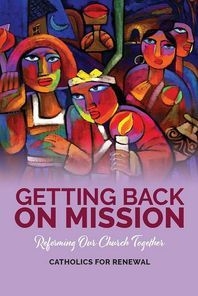
Catholics For Renewal, 17 August 2019
A report in The Age on 17 August 2019 by Debbie Cuthbertson, Chris Vedelago and Alex Blain, "Church unrepentant over confession stance amid child protection debate" includes the following reference to a position on Mandatory Reporting by Catholics For Renewal. "Catholics for Renewal, one of more than a dozen groups of lay people in Australia calling for reforms, has put forward dozens of recommendations that it plans to raise at the landmark 2020 meeting of the church’s Plenary Council, its first gathering since the sweeping reforms of the second Vatican Council in the 1960s. Its recommendations include that the Plenary Council “carefully examine the seal of confession as it currently operates ... with a view to maintaining its essential purpose while conforming to civil laws requiring reporting knowledge of child sexual abusers”. Catholics For Renewal arguments and recommendations on this are comprehensively detailed among other issues in its book "Getting Back on Mission. Reforming our Church Together" to be published in September by Garratt publishing. The book is an updated version of Catholics For Renewal's submission to the 2020/2021 Plenary Council of the Australian Catholic Church. This as one of around 17,500 submissions to the Plenary Council will collectively form summarised inputs to the Plenary Council rather than being directly raised by their authors at the Plenary. The last Australian Catholic Plenary Council was held around 80 years ago. Further details on the book are provided Here by Garratt Publishing.
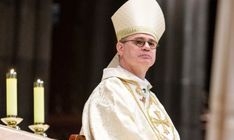
Extract from Opinion Piece, Archbishop Peter Comensoli, 17 August 2019
What is worth protecting and fighting for? The answer to that question is straightforward: our children. Of this, there is no doubt. The Royal Commission into Institutional Responses to Child Sexual Abuse cast a much-needed light on the failures of many institutions across Australia, including government and church institutions, and most prominently my own church. Melbourne Archbishop Peter Comensoli. It grieves me daily to know that young, and now adult lives, have been devastated and destroyed through multiple failures by the Catholic Church. We failed to hear, to believe, and to act on credible information regarding child sexual abuse. There is no stepping aside from this fact, and it drives my ongoing commitment to personally do everything in my power to create and maintain safe environments for children in our schools and parishes. I share the concern of our civic leaders that religious leaders like myself follow the laws of our land. I support religious ministers holding mandatory reporting responsibilities, a change the Catholic Church proposed in 2013. I have committed the Archdiocese of Melbourne to organisational and cultural change. We have policies, procedures and processes to achieve compliance with the Child Safe Standards; we are providing reports to the Commission for Children and Young People under the Reportable Conduct Scheme; we offer professional development of leaders and workers; we ensure accreditation of those involved in child related employment, and train our clergy and people in constant improvement in building a culture that recognises, respects and defends the rights of children and young people. Alongside this commitment I will also uphold the Seal of Confession. I recognise that many people find it hard to understand, or relate, to the importance of Confession in the lives of many Christians. Even some Catholics who haven’t "called in" for a long time only remember aspects of what it was once like. So why, when faced with Victoria's proposed new laws on mandatory reporting of child abuse, which would include information revealed in Confession, would any reasonable Catholic person, or any person for that matter, express concern?....(more). Photo: Archbishop Peter Comensoli, The Age, AAP
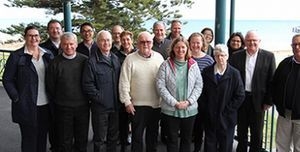
Extract from CathNews, ACBC Media Blog, 16 August 2019
The Bishops Commission for the Plenary Council and its executive committee have met in Adelaide for the first time, 14 months before the Council’s opening session in the South Australian capital. Source:
Plenary Council president Archbishop Timothy Costelloe SDB said the gathering of the two groups this week came at a liminal moment in the Plenary Council journey. “We recently completed the critical period of Listening and Dialogue, which closed with the publication of the comprehensive report summarising the voices of more than 222,000 people who shared their stories of faith and their experiences of the Church,” he explained. “Now, with the six National Themes for Discernment having emerged from that phase, we move into a period of Listening and Discernment, when Discernment and Writing groups will steer a national process that helps us move towards a deeper understanding of how we can become an even more Christ-centred Church in diverse ways. “Importantly, everyone who participated in the first phase – as well as those who didn’t – will get the chance to participate in an Australia-wide process of prayerfully discerning how the Holy Spirit is calling the Church to renew.” Plenary Council facilitator Lana Turvey-Collins said there was an overwhelming response to the call for applications to join the national Discernment and Writing groups, which was an additional sign of the level of engagement in the Plenary Council process. “With 50 to 60 lay people, religious and priests set to join 12 bishops across those six groups, it was very encouraging to have nearly 400 people offer to be part of the Discernment and Writing groups – many more than we are able to appoint to the role,” she said. “Every person, whether on the Discernment and Writing groups or not, is able to enter into this next prayerful stage of discerning how we are being called to go forward.....(more). Photo: CathNews, ABCB Media Blog, The Southern Cross
Extract from Hadeel Al-Alosi, Lecturer, School of Law, Western Sydney University, The Conversation, August 15, 2019 Updated August 16
Yesterday, Victorian Parliament finally debated a bill on whether religious ministers should be forced to disclose child abuse admitted in confidence to a priest. The Victorian Children Legislation Amendment Bill 2019 follows the recommendation of the Royal Commission into Institutional Responses to Child Sexual Abuse in 2017, which revealed the many failures of churches to report allegations of child abuse. But the proposed law reform has sparked strong opposition from some religious ministers. Melbourne Archbishop Peter Comensoli said he would rather go to jail than report a person who confessed committing child sexual abuse. He said: I will speak to the person there and then about how they will need to, one, go to the police about this […] and two, I’d be asking at the end of the confession to then repeat what they said outside of the seal so that I can then act. And Child Protection Minister Luke Donnellan told the ABC this morning that even the Melbourne Archbishop, the state’s most senior Catholic, is not above the law. He said: If people break the law they would be prosecuted. Several Australian state governments, including New South Wales and South Australia, have already passed laws legally obliging religious leaders to report confessions of child sexual abuse. Victoria will be following their lead if the law passes through both houses. The bill proposes several changes to strengthen the protection of children, on top of the proposed amendment of making it mandatory for religious ministries to report child abuse to protection authorities. This includes......(more)
Extract from CathNews, The Age, 16 August 2019
Cardinal George Pell will learn his fate next Wednesday when the Court of Appeal hands down its decision on whether to overturn his child sexual abuse convictions. Cardinal Pell was last year found guilty of sexually abusing two choirboys in the 1990s when he was Archbishop of Melbourne. His appeal was heard over two days in June. The Court of Appeal will hand down its judgment on Wednesday from 9.30am. It will be live-streamed from the Supreme Court website. Supreme Court Chief Justice Anne Ferguson, Justice Chris Maxwell, the president of the Court of Appeal, and Justice Mark Weinberg could overturn the convictions, uphold them, or order a retrial....(more)
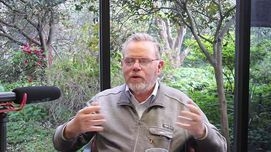
Extract from Bruce Duncan, Pearls & Irritations, John Menadue website, 15 August 2019
What will it take before the Morrison government recognises the great peril from climate change? Is the overwhelming consensus of scientists not enough, as they track the record-breaking heat waves globally? And why are religious leaders not echoing Pope Francis more vigorously about a looming ‘catastrophe’ from global warming? While the Morrison government dithers, climate specialists are alarmed that the chances to limit global warming are slipping away, with the likely result that we will be left facing truly catastrophic changes to the weather. The former Liberal leader, John Hewson, in the Fairfax media on 1 August, castigated the Morrison government for ignoring the overwhelming advice from, among many others, experts, fossil fuel miners, the Reserve Bank of Australia, and finance and insurance sectors. ‘I despair at just how long our Australian government can continue to deny the undeniable.’ Yet Australia is the largest exporter of fossil fuels, so damaging to the environment. Britain and Germany are planning to abandon coal in the ‘climate emergency’, while our government simply ignores the ‘urgency of the climate challenge’. According to official figures, Australia’s greenhouse gas emissions have been rising for the last three years, and we are not on track to meet commitments at the Paris climate conference by 2030 to reduce emissions from 2005 levels to between 26% and 28%. Yet Australia is again experiencing severe drought, and extreme weather is damaging our coastline, facilities, and fisheries. For the month of July, the years 2017, 2018, and 2019 were the hottest on record. Warnings from defence forces & the mining industry.....(more).
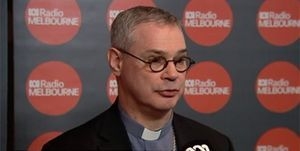
A bill which would make it mandatory for priests to report suspected child abuse to authorities, including abuse revealed in the confessional, was introduced to Victoria’s Parliament yesterday.
Extract from CathNews, ABC News, 15 August 2019
The Church last year formally rejected the notion that clergy should be legally forced to report abuse revealed during confessions. Interviewed on ABC Radio Melbourne yesterday, Archbishop Comensoli said he did not see the principles of mandatory reporting and the seal of confession as being “mutually exclusive”. He said he would encourage someone who admitted to abuse to tell police, and tell him again outside the confessional where he could then report it without breaking the seal of confession. But if the person confessing refused to do that, he said he would not break the Catholic tradition: “Personally, I’ll keep the seal,” he said. Archbishop Comensoli said most confessions were made anonymously and admissions of abuse were “deeply rare”. He said the “vastly more important” recommendations from the royal commission such as accreditation, supervision and ongoing training were not talked about. He said the Archdiocese of Melbourne had “very extensive” policies around child protection and underwent ongoing training and audits. “So all of those sorts of things, I think, are much more about the protection of children and are better at it on a practical level than this one particular thing. Yet this one particular thing has become nearly the all, and I think that’s a shame.” Meanwhile, Melbourne priest Fr Kevin Dillon said the Church “needs to recognise the enormous damage that’s been done” to abuse survivors. Fr Dillion, who has been an outspoken advocate for victims of Church abuse, suggested the laws were an opportunity to revisit the canon surrounding the confessional seal. But he did not say whether he himself would report abuse if it was confessed to him, instead saying: “I would have to follow my conscience at the time to do what I believe was the right thing to do.” Priests who break the seal of confession currently face excommunication from the Church.....(more).. Photo: CathNews,ABC News
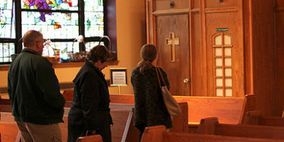
Edited Extract from CathNews, The Age, 14 August 2019
The Church is set to defy new laws in Victoria that would punish priests with jail time if they refuse to report sexual abuse revealed during confession. The Victorian Government will today introduce legislation aimed at forcing priests to break the seal of confession to report child abuse. The Church says that it supports mandatory reporting and encourages victims to report abuse to police, but will not break the seal of confession – regardless of the legislation. “I uphold the seal of confession but I uphold mandatory reporting as well,” Melbourne Archbishop Peter A. Comensoli said in August last year, when the government first flagged this legal change. “The principle of the seal of confession is a different question. It has a different reality to it. The practicalities of winding back the seal of confession I think is something that can’t be easily done.” “There’s been no change in our position,” a spokesman for the Melbourne Archdiocese said yesterday, adding that it would wait to see the legislation before commenting further. In March this year Pope Francis said no laws could break the seal of confession, in which all priests must keep secret from everyone what they hear in the confessional. “The sacramental seal is indispensable and no human power has, nor may it claim, jurisdiction over it,” he said. Priests who refuse to report sexual abuse disclosed during confession will face up to three years in jail under the new laws. The laws will apply to religious and spiritual leaders of all denominations and religions, but will not be retrospective. Victoria’s move comes a fortnight after Tasmania passed similar legislation. The ACT also recently passed a similar bill, set to take effect from September 1. Under an South Australian law that took effect in October 2018, clergy are legally obliged to report confessions of child sex abuse or face a $10,000 fine.....(more). Photo: confessional CathNews CNS 20190814
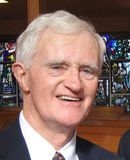
Extract from Opinion Piece, Eric Hodgens, Pearls & Irritations, John Menadue blog, 13 August 2019
We all have our personal story. And it is just one part of the bigger story of our family, our tribe, our nation – the things that have shaped us. Institutions, too, have a life of their own – and their own story. Where did they come from? What made them as they are? Religions are such. We need storytellers with long memories. And, if we get really serious about understanding all this, we need good historians. Christianity has the story and the historians who, over the last couple of centuries, have become better at their game. Christianity did not start out as a religion. It began firstly a movement within Judaism. There was the pre-existing story of Israel. Israel’s story had two strands – one establishment, with temple and priesthood; the other prophetic. The prophets were the critics of society. As the establishment got set in its ways, the prophets wanted constant review to keep true to their original purpose. They troubled the establishment. Jesus was such a prophet. His focus was on the best way to live to keep in tune with God – to make God’s Reign a reality. As he gathered followers, both of himself and his way, the establishment got his movement in its sights and we know how that ended up. But that was only the beginning of a new story. The movement grew and Jesus became the focus of its story. Then, following the tradition of Israel, they started to write. Paul was the first writer – letters of advice to cells he had set up. Then Mark created a new form of literature – the gospel. His purpose was to bolster his community which was struggling against opposition from outside and disintegration within. Then Matthew and Luke copied that style and wrote their own version of Mark’s story, focussing on the needs of their particular communities. Finally, John wrote his version for his community whose preoccupations you can glean if you read the text closely – if do a critique of the text. The first thing you need to do in critiquing the text is to discern why the writer composed it. Each writer has his own reason for writing. This, in turn, affects the way he writes. The gospels, for example, are anything but re-plays of what was said and done. Discerning the writers background, biases and purpose clarifies your understanding of the text.....(more). Photo: Eric Hodgens. Eric Hodgens is a retired Melbourne priest who “writes a bit”.


Extract from Ed Condon, Catholic News Agency, 9 August 2019
Cardinal George Pell has written a letter thanking supporters for their prayers and saying he is “disturbed” by the preparations for the forthcoming synod on the Amazon. The text of the two-page, handwritten letter - images of which were shared with CNA and confirmed by sources close to Pell - has been circulated amongst a group of Pell’s closest supporters in Australia. In the letter, dated from Melbourne Assessment Prison on August 1, the cardinal also says that he has been sustained in his incarceration by his faith and by the prayers of the faithful, and that he is offering his suffering in prison for the good of the Church. “The knowledge that my small suffering can be used for good purposes through being joined to Jesus’ suffering gives me purpose and direction,” Pell writes in the letter. “Challenges and problems in Church life should be confronted in a similar spirit of faith.” Pell goes on to say that “we have reason to be disturbed by the Instrumentum Laboris of the Amazonian Synod,” which was published in June ahead of the October meeting. That document, which has been the source of considerable discussion and commentary, included discussion on the subject of ordaining so-called viri probati, or “proven men” who are married, to answer a shortage of priestly vocations. The working document, which calls for “a Church with an indigenous face,” further recommends that the synod identify “an official ministry that can be conferred upon women, taking into account the central role they play in the Amazonian church.” “This is not the first low-quality document the Synod secretariat has produced,” Pell writes. The cardinal, apparently in reference to the considerable debate and criticism sparked by the synod’s proposed agenda - which has also included some calls for changes to the matter used to celebrate the Mass - also notes that “Cardinal G. Müller, formerly of the Congregation for the Doctrine of the Faith, has written an excellent critique.” “I am no expert on the region,” Pell says, though noting he has travelled to parts of the region, but cautions that “as in the Amazon, a lot of water has yet to run before the Synod.” “One point is fundamental, the Apostolic Tradition, the teaching of Jesus and the Apostles, taken from the New Testament and taught by Popes and Councils, by the Magisterium, is the only criterion doctrinally for all teaching on doctrine and practice.” “Amazon or no Amazon, in every land, the Church cannot allow any confusion, much less any contrary teaching, to damage the Apostolic Tradition,” he said....(more) Photo: CNA, Michel Dodge Getty Images.

Extract from Simon Chapelle, The Conversation, 8 August 2019
In a survey of 1000 New Zealanders, taken a month after the Christchurch mosque shootings of 15 March 2019, we asked respondents how much they trusted people from different religious groups living in New Zealand. We posed the question with reference to Catholics, Protestants, Evangelical Christians, Muslims, Hindus, Buddhists, atheists or agnostics, and Jews. We emphasised “living in New Zealand” as we were not interested in identifying New Zealanders’ trust in, for example, worldwide Catholicism or Islam. We are not aware of any previous consideration of trust in different religious groups within New Zealand. We used a five-point scale for responses – complete trust, lots of trust, some trust, little trust and no trust at all. We converted ordinal data (e.g. first, second, etc) into cardinal data (one, two, etc) by assuming equal intervals between categories to give a mean trust score. We found that the most trusted religious group in New Zealand is a small non-Christian group: Buddhists. In the most recent 2013 Census 58,000 Buddhists are recorded, out of about 3.9 million people who replied to the religious question. More people feel positively about Buddhists than not - 35% of New Zealanders have complete or lots of trust in Buddhists, while 15% have little or no trust. The least trusted religious group in New Zealand is a minority Christian group: Evangelicals (15,000 people in the 2013 Census). Fewer people trust Evangelicals than do not - 21% have complete or lots of trust, while 38% have little or no trust.....(more)
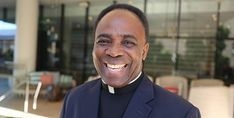
A warm welcome helps arriving priests, parishes
Extract from Mark Bowling, The Catholic Leader, 6 August 2019
A
major Church conference on missionary clergy and religious in Australia
has heard of the demographic shifting of the Catholic Church and the
need to welcome and nurture international priests. “The
Church is rich, the Church is vibrant because of its diversity,” Fr
Aniedi Okure, a Dominican priest and executive director of the Africa,
Faith and Justice Network in Washington, told the sixth national
conference on missionary clergy and religious in Australia, being held
in Brisbane. Fr Okure spoke on Tuesday
of the experience and challenges for clergy born outside the United
States, and trying to fit in to that country’s pastoral life. He
is an instructor at Loyola Marymount University’s Cultural Orientation
Program for International Ministers and described the process of “give
and take” needed to help an “incoming” priest adjust to a new pastoral
community in which he is going to serve. “Orientation
is crucial and should be undertaken as soon as the person arrives. It
is to prepare the missionary priest to enter appropriately to the new
context,” he said. “Orientation
diminishes cultural misunderstandings for both the missionary and the
ecclesial communities. In fact, cultural differences can make or break
the missionary, it can make or break the community.” Fr Okure said
careful orientation ensured that new priests “were not shy and enclosing
themselves”, but rather are able to use their experiences and gifts and
talents to contribute to enriching and enhancing their ecclesial
community. His orientation approach was now used by US bishops to generate guidelines and conduct pastoral planning. While
accepting that Australia is not identical to the United States, Fr
Okure said there are many lessons to learn from the US about welcoming
international priests.....(more) Photo: Okure Fr Aniedi Okure The Catholic Leader photo 20190706
Extract from Concerned Catholics, Canberra Goulburn, Pearls & Irritations, John Menadue blog, 6 August 2019
The credibility and success of the most important event in the Australian Catholic Church in many decades, the 2020 Plenary Council, depends on an open and frank airing of the grave issues crippling the Church. The chairman of Concerned Catholics, Emeritus Professor John Warhurst, said the lack of debate about and exposure of the submissions to the Plenary was unfortunate given the profound questions facing the Church, the steady decline in church attendances and continuing reports of clerical crimes around the world. He said that while it was welcome that a comprehensive report on all the voices of the participants in last year’s plenary “listening and dialogue” process was released on July 28, it was vital for the transparency and credibility of the Plenary that all submissions were put up on Plenary website. “An open and transparent airing of what people are seeking would be appropriate in the wake of the Royal Commission into Institutional Responses to Child Sexual Abuse and the compelling road map for reform recommended by the Commission,” Professor Warhurst said. “The Church through its bishops needs to lay bare what its people are saying they want and hope for their Church so we can have a vigorous and informed debate. “The Catholic National Centre for Pastoral Research has produced it final report on the submissions, including details of the number of submissions by country of birth, gender, age of individual submitters and the totals from each diocese. Canberra -Goulburn archdiocese, for instance, produced a total of 360 submissions, 269 of those from individuals and 91 from groups. “This report, while welcome, should only be the beginning, and should be accompanied by the public release of all submissions, except where privacy has been requested. There were 17,457 submissions involving more than 222,000 participants. These numbers alone should prompt the church leadership to ensure there is a process of open and transparent revelation of all the issues.....(more)

Extract from Peter Johnstone, Pearls & irritations, John Menadue blog, 5 August 2019
Peter Comensoli, still only 12 months into his new job as Archbishop of Melbourne, seems to have adopted the old ways of Catholic episcopal autocracy. He has unilaterally determined that an internationally acclaimed Catholic theologian, Sister Joan Chittister, be removed from the list of speakers at a conference of Australian educators in September 2020. It seems that Archbishop Comensoli takes decisions without the need for accountability, transparency or inclusiveness, or any regard for the views of the faithful, and is happy to reinforce the dysfunctional governance that was at the heart of the clerical child sexual abuse cover-up – business as usual. This does not augur well for the Plenary Council starting October 2020......(more)
Extract from Gerard O’Connell, America - The Jesuit Review, 4 August 2019
Pope Francis has written a letter to the more than 400,000 Catholic priests worldwide encouraging them during the tribulations from the sexual abuse crisis. The letter is meant to give priests, many of whom feel disheartened because of the horrendous crimes of abuse committed by a small percentage of their fellow priests, hope in these times of tribulation when they are so often blamed or treated with suspicion, distrust, contempt or ridicule. The letter comes as a surprise. Last year, on Aug. 20, in the wake of the Pennsylvania grand jury report and the former Cardinal Theodore McCarrick scandal, on the eve of his visit to Ireland, he wrote “A Letter to the People of God” in which he condemned outrightly the sexual and other abuses of minors by clergy as well as the failure of church leadership to take action and called for an effort by the entire church to deal with it. This year, he speaks directly to all priests because he is well aware and deeply concerned that in many countries, including the United States, Australia, Ireland, the United Kingdom, Germany and Chile, the morale of priests has suffered greatly because of the abuse scandal....(more)

Key Plenary Council topics emerge from final report of the Listening and Dialogue phase
Extract from Mark Bowling, The Catholic Leader, Brisbane, 2 August, 2019 Celibacy
for priests, the role of women, and the inclusion of divorced and
remarried Catholics were among “strongly discussed” topics contained in
the Plenary Council 2020’s latest report. The
final report of the council’s Listening and Dialogue phase captures the
voice of more than 222,000 Australians and provides insights into
17,457 group submissions. Plenary
council president Perth Archbishop Timothy Costelloe said the 314-page
document was the result of the listening process that had produced “an
extraordinary treasure of ideas and proposals which represents the
heartfelt response of many people”. “The
great challenge ahead of us now is to ‘catch’ the voice of the Holy
Spirit within the passionate, hopeful but sometimes contradictory voices
of God’s people.” Among the wide-ranging list of submissions
were those calling for ways to improve the sacraments to increase Church
attendance and “allow the fullness of a Catholic life to flourish”, and
addressing the clerical child sex abuse scandal. The
structure of Church life “drew a great deal of attention” around
leadership and governance, the need for greater listening between
leadership and the laity, and the need to “modernise Church teachings to
bring them in line with Australian society in the 21st
century”. Brisbane leads Plenary submissions Brisbane
archdiocese produced the highest number of individual submissions
(1890), and about 44 per cent of individual submissions (5663) were
received from those aged more than 50. Many respondents discussed the need for greater outreach and evangelisation, particularly to young people. Identified
as “critical” was a significant desire for the Church to humble itself
in the light of the sexual abuse crisis, and for more to be done to
offer healing and restoration to those affected....(more). Photo: Catholic Leader, Brisbane
Extract from media Release Catholic Professional Standards Limited, 2 AUGUST 2019
Catholic Professional Standards Limited (CPSL) has today published its first audit report of a Church entity that is subject to the National Catholic Safeguarding Standards (NCSS). The NCSS, based on recommendations made by the Royal Commission into Institutional Responses to Child Sexual Abuse and aligned with the National Principles for Child Safe Organisations, provide the framework for Catholic Church entities to build child-safe cultures and to advance the safety and dignity of children across the Catholic Church in Australia. The Presentation Sisters of Wagga Wagga (PSWW) is the first church entity to be audited under the NCSS. Comprising 38 sisters in the Wagga and Sydney region and 17 Papua New Guinean National sisters in the Aitape region, the Sisters involved in active and public ministry work with other organisations as skilled counsellors, prison chaplains, advocates, school breakfast program and support volunteers. As the number of Sisters in active ministry has declined, the congregation has established partnerships with universities, not for profit organisations and schools to continue their mission. PSWW no longer has governance of any ministries providing services directly to children. CPSL has made 12 recommendations to PSWW to strengthen its safeguarding practices as a result of the audit fieldwork which was conducted in April 2019. Recommendations are classified according to priority and urgency for remediation – there are no priority one (critical/urgent) recommendations arising from the audit of PSWW. Mediainal compliance assessment (completed at the end of June 2019) concluded that PSWW had fully implemented or was well progressed in the implementation of 61 (98%) of 62 indicators relevant to their ministries and operations. “The PSWW leadership team has been open, transparent and fully engaged throughout this audit,” said CPSL CEO, Sheree Limbrick....(more).
Massimo Faggioli explains how an essay by Karl Rahner some 65 years ago predicted the state of today's Church and offers a path forward
Limited extract from Massimo Faggioli, subscription Journal La Croix International, 30 July 2019
The number of Catholics continues to drop in Germany. More than 216,000 of them decided to "leave the Church" last year alone by ceasing to pay the government-mandated church tax. This is just the latest example of what has become a slow, but steady pattern of defections from the Catholic Church in the Western world. Baptized members already began leaving in the first half of the twentieth century, but they have done so in even greater numbers over the past 60 years. This does not mean Christianity is disappearing. But, almost everywhere, it shows that the Church is losing its tight control over the faith....(source)
Extract from Cathnews, 1 August 2019
Laws compelling priests in Tasmania to report child sexual abuse by breaking the seal of confession impinge on religious freedoms, says Hobart Archbishop Julian Porteous. Source: 9news.com.au. Reform to make religious ministers, plus members of the Tasmanian Parliament, mandatory reporters of child abuse or neglect became a step closer this week after passing the state’s lower house yesterday. Lifting the seal of confession was one of more than 400 recommendations made in 2018 by the child abuse royal commission. “Under this reform, members of religious ministry will not be able to rely on the confessional privilege to refuse to disclose information,” Attorney-General Elise Archer said. The legislation has the backing of survivor groups, but Archbishop Porteous believes it impinges on long-held Church teachings and the freedom of religion. “The law as currently drafted requires priests to violate the most solemn and sacred act between the penitent and God,” he said in a statement yesterday. “With the federal Government undertaking a review into religious freedom, now is not the time to introduce additional Tasmanian legislation....(more)
Archbishop Comensoli 'did not revoke' US sister’s invitation
Extracts from CathNews, The Age, 29 July 2019
Melbourne Archbishop Peter A. Comensoli says he neither invited nor revoked any invitation to US Benedictine Sr Joan Chittister to speak at a national education conference next year. Tensions emerged last month when it was revealed that Sr Joan – an author, feminist and advocate of Church reform – had been asked to take part in the 2020 National Catholic Education Conference in Melbourne, only to have her invitation rescinded a few weeks later. “I am very saddened to say that while our organising committee strongly supported the inclusion of Sr Joan as a speaker at the conference, the Archbishop of Melbourne has failed to endorse her inclusion,” John Meneely, the Ballarat Catholic Education Office deputy director, wrote in a June 1 email seen by The Sunday Age. “I am presently seeking [an] explanation for his reasoning.”......The Archdiocese issued a statement on Friday night acknowledging that Archbishop Comensoli was advised in May of “a proposal for Sr Joan Chittister to speak at the National Catholic Education Commission Conference”. “When the conference was raised with him, Archbishop Comensoli requested that more names aligned to the themes of a national Catholic education conference be considered,” the spokesman said. “The conference is a national conference with an organising committee drawn from leaders in Catholic education that is engaged in dialogue as part of the planning with a range of stakeholders including Catholic education leaders, Church representatives and bishops....(more)
Extract from Farrah Tomazin, The Sydney Morning Herald, 28 July 2019
Catholic leader Peter Comensoli has been accused of censorship on the eve of his first anniversary as Melbourne Archbishop, after an outspoken nun was disendorsed from speaking at a conference soon after he learnt of plans to include her. Facing a backlash from rank-and-file Catholics, the Archbishop was this week forced to explain his role in a damaging snub involving Sister Joan Chittister, a US author, feminist and advocate of church reform....(more)
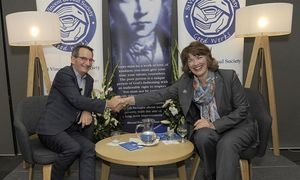
Extract from John Warhurst, Eureka street, 24 July 2019
Everyone interested in the Australian Catholic Church's Plenary Council 2020 (PC), the first session of which is scheduled for next October in Adelaide, should now take a serious interest in Ignatian discernment. That follows the announcement that the promised Working Groups have been renamed Discernment and Writing Groups. This is more than a mere rebranding exercise but a clear and deliberate indication that prayer and discernment are 'key for the groups, and for the whole process'. St Peter's Cathedral in North Adelaide. Questioning Catholics should embrace this development, but resist any aspect of the new process which tends to dilute or exclude their voices. As explained by PC Facilitation Team leader, Lana Turvey-Collins, in the latest issue of Plenary Post, discernment in the spirit of Pope Francis in relation to the Plenary Council was a focus of the recent Bishops Retreat led by Jesuit Br Ian Cribb SJ. Discernment has a general meaning associated with the ability to exercise judgement with skill and wisdom in complex circumstances. It is often used in religious circles, together with consultation, to enable prayerful reflection and discussion in a spirit of collegiality to produce the best outcome. Spiritual discernment involves calling on the Holy Spirit to give directions on the will of God. It is a gift from God and more than a skill. It asks the Plenary Council question: 'What is God asking of us? In the words of Pope Francis it transcends but does not exclude 'existential, psychological, sociological or moral insights drawn from the human sciences'. The approach includes elements of good process and skill, which can be gained by experience and/or taught through training. This PC Discernment period follows a Listening period, which generated about 17,500 submissions drawn from more than 220,000 participants from across the Australian church. These submissions led to the choice by the leadership of the six themes on which the Discernment and Writing Groups are to be based. Applications for volunteer chairs and members of these groups have just closed. The chairs of these groups will receive an intensive induction in discernment before taking up these demanding roles. It is an unwelcome surprise that the submissions themselves will not be made public despite an expectation that they would be. In this electronic age that should have been possible, unless otherwise requested by participants, as is the case with equivalent government consultations....(more). Photo: Eureka Street, Moisseyev via Getty
Extract from a recent Introduction by John Menadue on Pearls & Irritations to an addreess by George Pell 8 Years ago, on the type of church that he was trying to build in Australia. It casts a long and dark shadow.....(more)

Extract from J.A. Dick, Another Voice: Reflections about contemporary Christian Belief and Practice, Being a Theologian, 19 July 2019
Recent events emanating from Washington DC compel me to reflect and write about how we treat one another in political discourse. I am not writing about politics but about virtue and public morality. What were once episodes of ugly verbal abuse are now evolving into a plague of racism, misogyny, and xenophobia. A fierce polarization is creating deep divisions. Civility is being replaced by adolescent-type bullying and public denigration of anyone who challenges and questions the administration. There is nothing Christian about such behavior and it creates a threateningly inhumane cultural environment. Civility means much more than politeness, although politeness is indeed an important first step. Civility is about interpersonal respect and seeking common ground as a starting point for dialogue about differences. It is about moving beyond preconceptions and listening to the other and encouraging others to do the same. Civility is hard work because it means staying present to people with whom one can have deep-rooted and fierce disagreements. It is political in the sense that it is a necessary prerequisite for civic action. Civility means collaborating for the common good. It is about negotiating interpersonal power in such a way that everyone’s voice is heard, and nobody’s voice is ignored. Civility means that despite different perspectives we still have a shared vision and collaborate to make it a reality. When civility is replaced by mockery, dishonest accusations, and abusive slogans, people become monsters. History amply demonstrates that monsters create more monsters. History also reminds us that such a scenario never has a happy ending. The message this week is small. The task awaiting us is enormous. Civility begins with you and me, with family and friends, with neighbors and colleagues, etc. We gradually construct what I like to call coalitions of transformation: communities of faith, hope, and support. At the end of this week, we all should reflect on the message in Luke 10:25-37: On one occasion an expert in the law, who wanted to justify himself, stood up to test Jesus and so he asked Jesus “And who is my neighbor?”....(source). Image: J A Dick Civility 20190719

Extract from John Warhurst, Eureka street, 24 July 2019
Everyone interested in the Australian Catholic Church's Plenary Council 2020 (PC), the first session of which is scheduled for next October in Adelaide, should now take a serious interest in Ignatian discernment. That follows the announcement that the promised Working Groups have been renamed Discernment and Writing Groups. This is more than a mere rebranding exercise but a clear and deliberate indication that prayer and discernment are 'key for the groups, and for the whole process'. St Peter's Cathedral in North Adelaide. Questioning Catholics should embrace this development, but resist any aspect of the new process which tends to dilute or exclude their voices. As explained by PC Facilitation Team leader, Lana Turvey-Collins, in the latest issue of Plenary Post, discernment in the spirit of Pope Francis in relation to the Plenary Council was a focus of the recent Bishops Retreat led by Jesuit Br Ian Cribb SJ. Discernment has a general meaning associated with the ability to exercise judgement with skill and wisdom in complex circumstances. It is often used in religious circles, together with consultation, to enable prayerful reflection and discussion in a spirit of collegiality to produce the best outcome. Spiritual discernment involves calling on the Holy Spirit to give directions on the will of God. It is a gift from God and more than a skill. It asks the Plenary Council question: 'What is God asking of us? In the words of Pope Francis it transcends but does not exclude 'existential, psychological, sociological or moral insights drawn from the human sciences'. The approach includes elements of good process and skill, which can be gained by experience and/or taught through training. This PC Discernment period follows a Listening period, which generated about 17,500 submissions drawn from more than 220,000 participants from across the Australian church. These submissions led to the choice by the leadership of the six themes on which the Discernment and Writing Groups are to be based. Applications for volunteer chairs and members of these groups have just closed. The chairs of these groups will receive an intensive induction in discernment before taking up these demanding roles. It is an unwelcome surprise that the submissions themselves will not be made public despite an expectation that they would be. In this electronic age that should have been possible, unless otherwise requested by participants, as is the case with equivalent government consultations....(more). Photo: Eureka Street, Moisseyev via Getty

Extract from CathNews, The Tablet, 19 July 2019
A cardinal serving in the Amazon has hit back at critics of the forthcoming Synod on the region, emphasising it will help the Church stand with exploited indigenous communities and become an effective evangelising presence. Cardinal Pedro Barreto, a Jesuit whose archdiocese of Huncayo covers the western Amazonian region of Peru, has challenged the assumption that the territory is a “backward space”, urging “non-Amazonian societies” to learn from local cultures and their ability to protect the environment. His intervention, contained in an article for La Civilta Cattolica magazine, comes amid intense criticism from Rome-based cardinals, Cardinal Gerhard Müller and Cardinal Raymond Burke, and traditionalist groups of the Amazon Synod’s working document, published last month. The Synod of Bishops for the Pan-Amazonian region has been called by Pope Francis and will take place from October 6-27 in the Vatican. It is the first Church gathering of its kind to focus on the needs of a vast area covering Bolivia, Brazil, Colombia, Ecuador, Guyana, Peru, Suriname, Venezuela and the overseas territory French Guyana. Synod organisers say the aim is to build a prophetic, mission-centred Church in the Amazon, deeply rooted in the indigenous communities, and ecologically sensitive. Its working document includes whether to ordain married elders as priests given the scarcity of clergy, along with liturgies that take into account local customs, and rituals. Cardinal Barreto said the working document is an “expression of the voice of the people of God”.....(more) Photo: Amazon, worldforms.com
Extract from Patty Fawkner SGS, Pearls & Irritations, John Menadue Website, 19 July 2019
It was decades ago, but I remember the day and the conversation well. It was a Monday morning and I was returning to work at a Catholic adult education organisation after a short break. I was confronted with the news that, during my absence, our newly appointed director had removed copies of Paul Collins’ book, Papal Power, from the organisation’s bookstore. Nominally, I was the deputy director and when I asked “Why?” was told “Because it only tells one side of the story”. To which I quickly retorted, “Well, wouldn’t the adult thing be to supply other books that told a different side?” Till then, “Towards an Adult Church” was the mantra of all that we did within that organisation. The phrase encapsulated our vision and guided both content and process of our programs. The words certainly had been the “hook” for my joining the organisation. Fast forward 23 years and I immediately recalled this event when news broke that an invitation to Sister Joan Chittister OSB to be a keynote speaker at the 2020 National Catholic Education Conference in Melbourne had subsequently been withdrawn. ‘While there’s some contention over whether a formal invitation was made, Joan believes that she was invited and has received no reason for the snub. This is in spite of Recommendation 16.7 of the Royal Commission into Institutional Responses to Child Sexual Abuse which calls for Church authorities to conduct a review of Church structures in relation to issues of transparency. It is reminiscent of the 2018 ban imposed by the Hobart Archbishop on Father Frank Brennan SJ, precluding him from speaking at a conference on marriage equality. It occurs to me that these three actions are anything but “adult” and, not only say something about the views some Church leaders’ hold about some Catholic religious and clergy, they say something more about their views of us, “the faithful”. When we are denied information and when perspectives are censored, we are treated like children. Is it that we are neither intelligent enough nor mature enough to weigh different opinions and test these against our own conscience, experience and faith? On a recent visit to Rome I was privileged to engage in an audience with Pope Francis as part of the Assembly of UISG, the international union of leaders of Catholic women’s religious congregations. “Let’s have a conversation,” the Pope said as he discarded his prepared talk. Among other things, Pope Francis encouraged the 850 leaders not to be afraid of dialogue either within or beyond the Church. He practised what he preached. He invited spontaneous questions from the audience and no topic was deemed to be ‘out of bounds’. My heart warmed as I observed Francis listen intently and ask clarifying questions to ensure he understood the intent of the question. He responded with deep respect, openness, warmth and a refreshing blend of seriousness and humour. Am I naïve in believing that Pope Francis would be open to dialogue with Joan Chittister?....(more)
Extract from Melbourne Catholic, Australian Catholic Bishops Conference, 18 July 2019
The Catholic Church is developing new national policy guidelines to strengthen and standardise Church authorities’ responses to historical and contemporary concerns and allegations of abuse of children and vulnerable adults. Archbishop Mark Coleridge, president of the Australian Catholic Bishops Conference, said the development of the guidelines is a critical step forward in the Church’s ongoing response to the recommendations of the Royal Commission into Institutional Responses to Child Sexual Abuse. ‘The bishops are following through on our commitments made last year, and having a consistent approach to the management of allegations of abuse of children and vulnerable people is central to our reforms,’ he explained. The Implementation Advisory Group, set up in May 2018 to monitor and advise Catholic leaders on the Church’s response to the Royal Commission’s recommendations, is overseeing the development of the policy guidelines. The guidelines will serve as a public commitment to integrity and accountability in responding to allegations of abuse. They will make clear the obligations of all Church authorities to respond with processes that are fair and effective, and which comply with all Australian laws....(more).
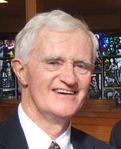
Extract from Eric Hodgens, Pearls & irritations, John Menadue Blog, 18 April 2019
The Catholic Church is now in freefall. Vatican II called for adaptation to the modern world. Most of the opportunities for adaptation have been missed. How do we catch the last bus? Since WW II the western Catholic Church has been visibly in decline. This is part of a huge cultural change which is world-wide. Christendom was the prevailing social and political structure of Europe from the 4th century to the 17th. A high point was Louis XIV, hand in hand with the French hierarchy. But at the same time the Enlightenment was raging, undermining its very core structure. Meanwhile, across the Atlantic in America a new, democratic social order was being established, based on Enlightenment principles. Democracy won the day and the Church was left a disempowered widow. The full effect of enlightenment ideas, like power from the people and individual human rights, came to the fore in the reconstruction of Europe after the devastation of WWII. The Church still looked the same, but was no longer the political force it had been. Vatican II was called to work out how to handle this new world order. It changed the preferred image of the Catholic Church from that of a hierarchical organization set up by God, to the People of God on a common journey. The egalitarian and interactive qualities of the new world order replaced the hierarchical and static qualities of the pre-Enlightenment order. The Church was adapting to the modern world – on paper. Many who formerly had submitted to the old order had sniffed the breeze and abandoned the church. That flow of departures – small enough to start – was to grow into a torrent. Vatican II had alerted us to equality of membership and the need to adapt to fast social changes, but it was up to the membership to be nimble footed in adapting if it was to stem the collapse.....(more)
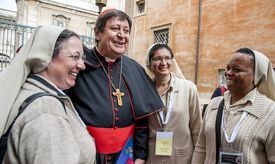
Joao Braz de Aviz says our relationships with the Church and each other need constant re-evaluation
Limited extract from Anne-Bénédicte Hoffner, subscription journal La Croix International, 17 July 2019
"You have to look at what is fundamental and what is not. Many things of tradition, which are more of an ancient culture, are no longer useful," Brazilian Cardinal Joao Braz de Aviz told Paraguayan newspaper Ultima Hora on July 14. Prefect of the Congregation for Institutes of Consecrated Life and Societies of Apostolic Life since 2011, the cardinal was sent by Pope Francis to participate in a gathering of 90 religious congregations in Paraguay, which was celebrating the 60th anniversary of the South American country's Conference of Religions....(source). Photo: La Croix International, Cardinal Joao Braz de Aviz
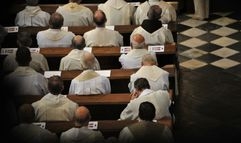
Extract from Fr. Peter Daly, National Catholic Reporter, 15 July 2019
We cannot bring about real reform of the Roman Catholic priesthood unless we do away with mandatory celibacy for diocesan priests in the Latin rite. Why would that improve the priesthood? It would make priests more honest about ourselves and sexuality. With real parents in the priesthood, it would make us more aware of the vulnerability of children and more outraged at their abuse. (Does anybody really think that if bishops were also real fathers that they would have covered up so much child abuse?). With husbands in the priesthood, it would make us more respectful of women and their opinions. Married priests would also break up the "old boys" clique that surrounds clerical culture in seminaries and chancery offices. Optional celibacy would also substantially expand the pool of potential candidates for the priesthood. It would not only increase our numbers but improve our quality. Priestly celibacy is not all bad. As St. Paul says in 1 Corinthians 7:32, unmarried men are free to be "anxious" about the things of the Lord. Celibate priests can, if they want, be more single-mindedly available for the service of the church, without the competing demands of a wife and family. However, this is not always the case. I have known many celibate clergy who were single-mindedly anxious only about themselves. Celibacy will always have some place in the life of the Catholic Church. Men's and women's religious communities would not be possible without celibacy. And there will always be a place for those who wish to be voluntarily celibate in the diocesan priesthood. But, having tipped my hat to the place of celibacy and the good things it can give to the church, I want to say in the strongest terms possible that I believe that celibacy harms the church and damages the lives of most priests.....(more). Photo: National Catholic Reporter, Dreamstim Peacepix
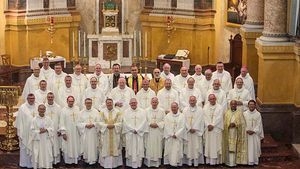
Extracts from Alex Ford, The Courier, 14 July 2019
Pope Francis expressed his "personal sadness and sorrow" for those sexually abused by priests in a rare roundtable meeting with Australian bishops last month. The Catholic Bishop of Ballarat, Paul Bird, was at the table, and asked Pope Francis to pray for the diocese. "He really did express a very deep sadness at any abuse of a child, and I suppose he was trying to express his compassion for those who suffered and I asked him to pray with us, basically, for those who suffered both directly and indirectly - the families or the whole community, as we're very conscious of in Ballarat," he said. "He was very much in tune with that, I think, expressing his personal sadness and sorrow." Bishop Bird was in the Vatican for the Ad Limina Apostolorum pilgrimage, which all bishops must regularly complete - this is the first time Australian bishops have visited since 2011. The 38 bishops also visited several Vatican departments and dicastries, including the Council for the Protection of Minors. "We met the Pope on the Monday morning, then later that afternoon we met that Council for the Protection of Minors, and it was there we talked about the steps that had been taken in Australia," Bishop Bird explained. "In Victoria, for example, we had that Victorian inquiry, then there are standards set by the Victoiran government which we as a church had adopted and put into policies and procedures for that. "And then, they were really expanded when the Royal Commission had their national inquiry. "We've adopted those, and currently we're having an audit, that's coming up towards the final meetings in a few weeks time - we're having an audit of how that is being implemented in the diocese, both in the parishes and in the schools and social services." He noted there would likely be an Australian contribution to the Council's major project promoting "best practice" in protecting children. "I think the Australian experience will be helpful for that - they will draw on that, and the idea is that if you can share good examples, so people around the world, as in every field, can help everybody and they don't have to reinvent the wheel," he said....(more) Photo: Ballarat Courier, ACBC

Brisbane Assembly, an archdiocesan Plenary Council 2020 event, is expected to unite more than 600 Catholics across two days of communal discernment on October 4 and 5
Extract from Joe Higgins, The Catholic Leader, July 12, 2019
Brisbane archdiocesan Plenary Council co-ordinator Eric Robinson said the Brisbane Assembly would be a great chance for people to hear directly from the national facilitation team – “where we’ve come from, where we’re at and where we’re heading”. “It will be a really high-quality experience of listening and discernment from these spiritual conversations,” he said. This experience of communal discernment was a great tool in itself, Mr Robinson said. He said it was a tool that event participants could take back to their own parishes and communities. He also said Brisbane Assembly would be a chance for the diverse parishes of Brisbane archdiocese to discern together and leave ready to implement local action in their communities. “My hope is that people walk away from the assembly with hope and feeling empowered about this plenary journey and their role in it,” Mr Robinson said. But it was also a great chance to network. Mr Robinson said particularly in the informal parts of the event, like lunch or breaks, it was a great chance to meet like-minded people and discover new connections. In an online invitation video, Brisbane Archbishop Mark Coleridge said the location, St Laurence’s Edmund Rice Performing Arts Centre, was a magnificent facility used for events like the Proclaim conference. “We’ll be back there and we will be entering into an experience of communal discernment, trying to discern what the (Holy) Spirit is saying,” Archbishop Coleridge said. “We will have excellent facilitators, top-class presenters, and even if you can’t be there, Shalom TV will in fact be live-streaming many of the sessions.” Mr Robinson said people should register for Brisbane Assembly as soon as possible because there were limited tickets. He also had some advice in the lead-up to Brisbane Assembly.....(More). Photo: The Catholic Leader, Mark Bowling
Extract from Amber Wilson, The Age, 12 July 2019
A judge who will soon sentence a repeat offender paedophile priest has condemned the Catholic Church for prioritising "the sinner" over his young victims. Robert Claffey, 76, is already serving more than a decade in prison for sexually abusing 12 children as young as five, between 1969 and 1992. The church became aware of his behaviour in the 1980s, but moved him from "parish to parish" throughout western Victoria, at one point even installing him as a replacement for notorious paedophile Gerald Ridsdale. In 2016, Claffey was jailed for a minimum of 13 years and four months. But on Monday, Claffey admitted he abused another two boys in Ballarat during the 1980s, following fresh allegations. One of the victims was aged between 12 and 15 at the time, while the other was aged six to seven.....While noting the Catholic Church was "not in the dock", Judge Higham added the church did not report Claffey to police, but simply moved him around. "Their priority was to bring the sinner back to the church rather than protect the children," he said. "The church did not report him to the police and he did not report himself to the police. Where is the evidence that he had this matter hanging over him ... over the decades?....(more)

Extract from J.A. Dick, Another Voice, Reflections about Contemporary Christian Belief and Practice, 12 July 2019
On Monday, July 8, the US Secretary of State Mike Pompeo announced the creation of an advisory commission: the “Commission on Unalienable Rights.” He hopes it “will provide the intellectual grist of what I hope will be one of the most profound re-examinations of inalienable rights in the world since the 1948 Universal Declaration.” The Commission on Unalienable Rights will be headed by Mary Ann Glendon, the Learned Hand Professor of Law at Harvard Law School and a former United States Ambassador to the Holy See. When he was a law student at Harvard, Pompeo was Glendon’s research assistant. Glendon, when thanking Pompeo for the appointment, stressed that this is a time when “basic human rights are being misunderstood by many, manipulated by many and ignored by the world’s worst human rights violators.” One can agree with her, perhaps, but then one needs to make some important distinctions. Mary Ann Glendon’s statement, underlines my current concerns about the basis for human rights today and what has been called the “natural law.” Indeed, when setting up the commission at the State Department, the Secretary of State said its purpose would be to redefine human rights based on “natural law and natural rights.” What is natural is a perennial question. Viewed over several centuries, “natural law” has often had a wax nose, which has bern twisted to accommodate the morality of those in power, in church and state. Arguments based on natural law have been used to justify slavery, condone torture, denigrate women, condemn gays, and of course (in the Catholic Church) to condemn contraception. Nevertheless, my observations today are not about politics, Pompeo, or Glendon. The more important issue is clarifying, first of all, what we mean by “natural law” and, secondly, how one can promote an international ethic, still struggling to be born under the rubric of human rights.....(more). Photo: Another Voice
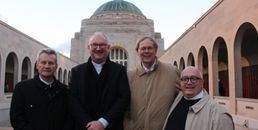
Extract from CathNews, ACBC Media Blog, 11 July 2019
The general secretaries of the bishops conferences of England and Wales, Germany and France have completed a three-day visit to Canberra that examined key issues facing the Church in Australia and globally. Fr Stephen Hackett MSC, general secretary of the Australian Catholic Bishops Conference, said he was “delighted” to host the “very beneficial” gathering, which moves from country to country each year. “I find it very reassuring that every time we meet, in different ways we’re facing many of the same issues,” Fr Hackett said, while acknowledging that some of those issues have arisen at different times in the various countries. It’s good to get the different perspectives on how we respond to the issues that concern us at this time.” Among the key topics for discussion were the Plenary Council 2020 and the Church’s response to the Royal Commission into Institutional Responses to Child Sexual Abuse. Fr Christopher Thomas, general secretary of the Bishops’ Conference of England and Wales, said while the Church in those countries can be “a bit parochial”, learning about the various “joys and difficulties” in other contexts around the world is important. “The Plenary Council is a bold step because it’s most definitely not a top-down approach. It’s a listening and discerning exercise which I think the Church, under the leadership of Pope Francis, is certainly being encouraged to take,” he said. Fr Thomas said another of the fruitful discussions that took place during the meeting of general secretaries was on the royal commission and the Church’s response to the commission and its recommendations. Germany’s Fr Hans Langendorfer SJ, who has attended a number of meetings of general secretaries, said the gatherings are filled with energy and provide insights into the Church and its mission in various countries. He said the Church in Germany had suffered a loss in credibility and in its reputation, but a process similar to the Plenary Council could help the Church there respond to those challenges. He and other Church leaders in Germany will closely watch how the council unfolds in Australia, Fr Langendorfer said......(more). Photo CathNews ACBC Media Blog
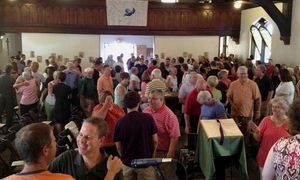
Extracts from by Joseph Martos, National catholic Reporter, 11 July 2019
....For almost 30 years, the St. William Catholic Community in Louisville, Kentucky, has had a lay parochial administrator but, even before that, all-important decisions were made by the people of the parish. Founded in 1901 to serve Irish immigrants who worked in the nearby railroad yards, membership was down to 85 by the early 1960s as railroad workers were displaced by computers to disassemble and reassemble freight trains passing through Louisville. The crashing together of boxcars and flatbeds can still be heard in summer when the church windows are open. We had decided sometime back not to install air conditioning in an effort to save energy and do our bit to preserve the environment. No one knows why the parish was named St. William, or which St. William the bishop had in mind, but some point out that the bishop at the time was named William and hint at a personal motive. Around 1995, the parish adopted St. William of Donjeon as its patron, a medieval monk who objected to being chosen bishop and who was known for ministering to the poor, the sick and the imprisoned. Clearly our type of guy. Faced with the option to close the dwindling parish in 1969, Archbishop Thomas McDonough decided to put it in the hands of a young priest named Ben O'Connor, suggesting that he try implementing the liturgical changes approved by the Second Vatican Council. Out went the Gothic altar; in came a plain wooden table. Out went the pews; in came chairs that could be rearranged as wanted. Out went Gregorian chant; in came guitar Masses. Within a few years, St. William became one of the most popular churches in the city, drawing people from around the archdiocese and even from Indiana, across the Ohio River......Archbishop Thomas Kelly adapted to the priest shortage by appointing an active church member to be parochial administrator for the parish. With no priest in charge, community members became even more involved in sustaining the parish and creating new ministries....(more) Photo: NCR St William Catholic Community.
The role of young people and their place in the development of the future Catholic Church was the focus of a talk last week by Daniel Ang, the Director of Parish 2020, a process of parish renewal and revitalisation in the Archdiocese of Sydney.
Extract from Eric Martin,The Record, Archdiocese of Perth, 11 Jul 2019
Mr Ang addressed a Perth audience at Newman Siena Centre on 4 July, in a speaker event organised by the Centre for Faith Enrichment. “Our culture is changing, our Church is changing and the role of young people in our Church is perhaps a prophetic sign of how we can live the mission of Jesus in possibly new ways that have not been imagined before,” Mr Ang said. “I think that often parishes especially want young people for their life and their vitality and the hope that young people bring to our parish communities. “And yet, there’s a drop off in Years 11 and 12 in high school, a disinterest from Year 10 onwards – we sense also that we’re losing a lot of people after school during university and when other things come into play. “We lose a lot of people between 25 and 35, so we don’t see many people in their late 20s and early 30s – they quietly leave and we don’t see them again.” Previously serving as Director of the Office for Evangelisation in the Diocese of Broken Bay, encompassing the youth ministry, adult education, CCD, and life, marriage and family apostolates of the Diocese – Mr Ang also holds a Bachelor of Arts & Bachelor of Commerce from the University of Sydney, and a Master of Divinity from the Sydney College of Divinity, undertaken at the Catholic Institute of Sydney. As such, he is an acknowledged expert in the area of Youth Ministry, which served as an important source of information and encouragement to Perth’s parish youth leaders. “If youth ministry is there to prepare young people for adult discipleship, how well are we preparing young people for that broader life?” Mr Ang asked the Perth audience. “Youth ministry is not simply to hold people in the Church when they’re young but it’s there to actually animate and inspire and equip young people to leave youth ministry and become adult disciples. Mr Ang explained that his research shows that young people aren’t necessarily attracted to parishes and communities that don’t show any life in themselves: making youth ministry not just for young people, but one that actually engages the whole Church and asks bigger questions around “what kind of Catholic culture do we foster to enable young people to be missionaries?”.....(More).
The 'note of the Apostolic Penitentiary on the importance of the internal forum and the inviolability of the sacramental seal' was released by the Vatican on July 1
Limited extract from staff, subscription journal La Croix International, 2 July 2019
Vatican City. Pope Francis has ordered the publication of a document affirming the absolute secrecy of everything said in confession and calling on priests to defend it at all costs. The "note of the Apostolic Penitentiary on the importance of the internal forum and the inviolability of the sacramental seal" was released by the Vatican on July 1. The Note (only in Italian) was approved for publication by Pope Francis on June 21. It upholds the absolute inviolability of the Seal of Confession, meaning that priests may never reveal what they learn in the Sacrament of Reconciliation.....(more)
